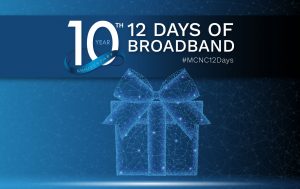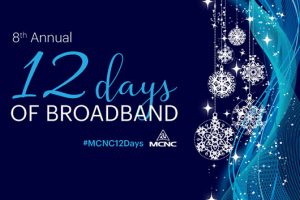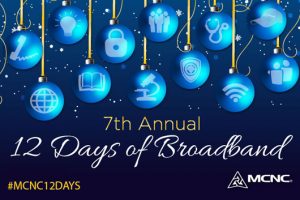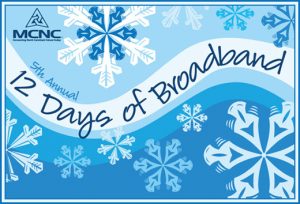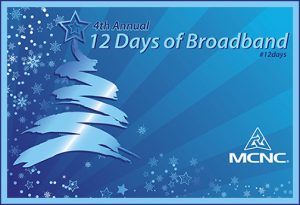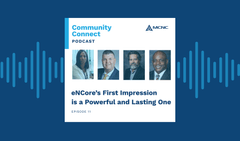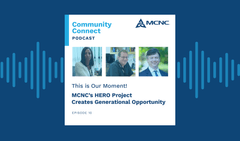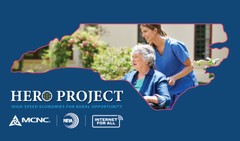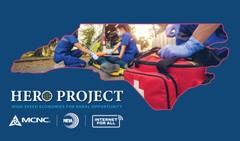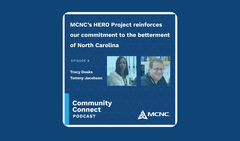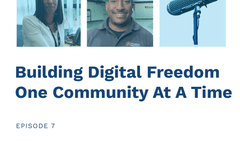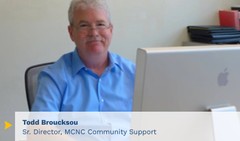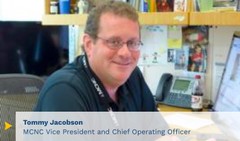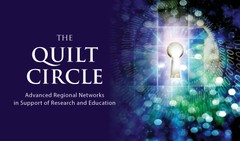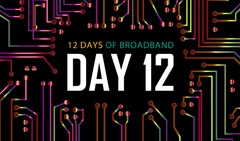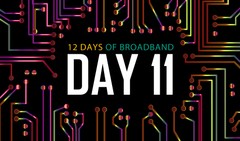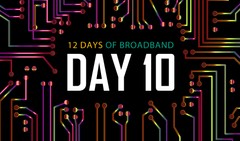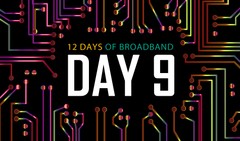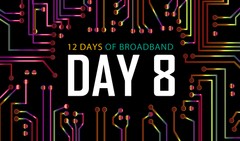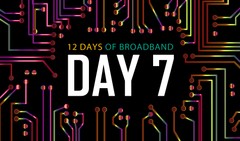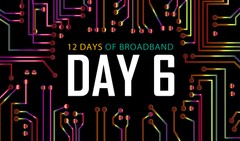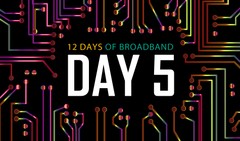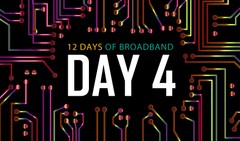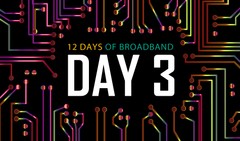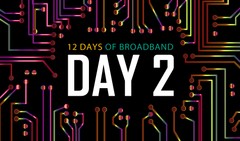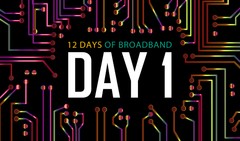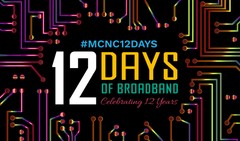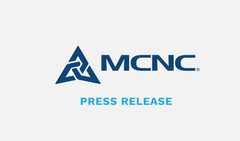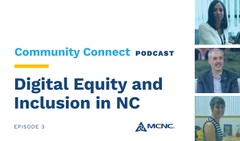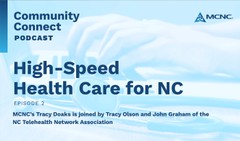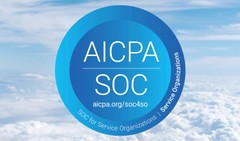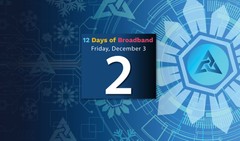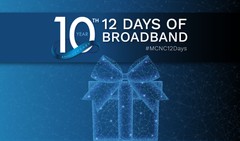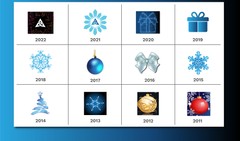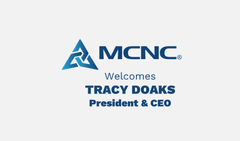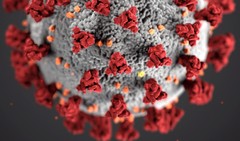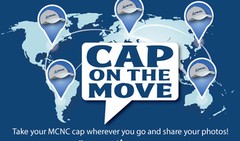The 12 Days of Broadband Reflections: 2011-2023
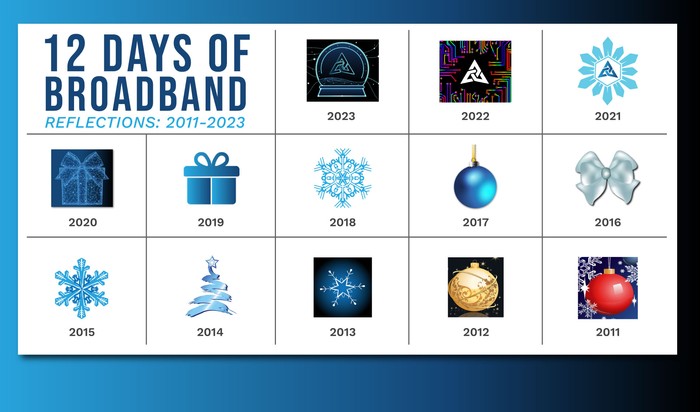
For thirteen consecutive years, MCNC has highlighted a dozen broadband-related stories from the calendar year to create the 12 Days of Broadband. These annual articles are a nice way to end the year, recap MCNC’s own top activities and accomplishments as well as feature important news from our clients and other regional, state, and national broadband organizations.
The 14th anniversary of the 12 Days of Broadband will commence this year in early December. As you await a fresh set of stories for 2024, we invite you to peruse the early years to see how the campaign has evolved, what’s changed over the last decade, and jog a few memories as well to get you thinking about the future.
Throughout the thirteen years you will notice at least one commonality – they all are a positive view of that year’s state of broadband. So, join us in a 12 Days of Broadband reflection now while we await the new stories coming soon for what has been an unprecedented 2024.
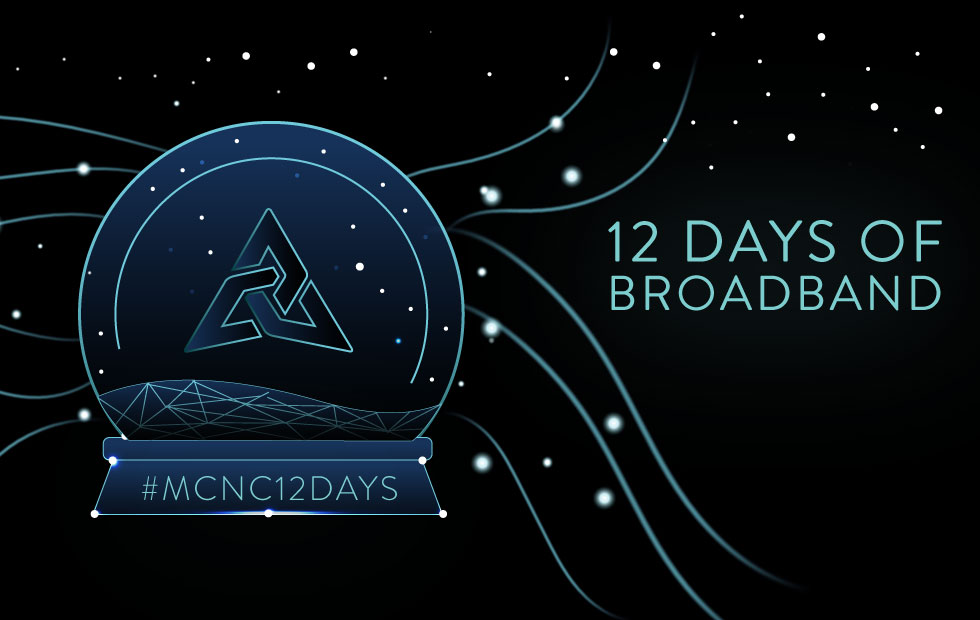
View the 13th Annual 12 Days of Broadband here…
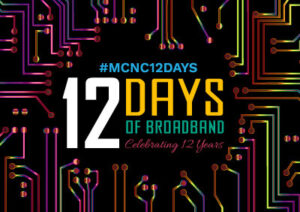
View the 12th Annual 12 Days of Broadband here…

View the 11th Annual 12 Days of Broadband here…
View the 10th Annual 12 Days of Broadband here…
Welcome to MCNC’s 9th Annual 12 Days of Broadband
MCNC’s 9th Annual 12 Days of Broadband – 2019
The 12 Days of Broadband are back!
From Dec. 5 – Dec. 20, The 12 Days of Broadband features a dozen stories on how broadband positively impacts communities in North Carolina and beyond, as well as previews what’s to come in 2020.
Now in its ninth year, the 12 Days of Broadband showcases how investments in network infrastructure, bandwidth, valued-added services, and security in North Carolina can help ensure citizens are prepared for today’s interconnected economy.
The North Carolina Research and Education Network (NCREN), which today spans 3,908 miles, has provided broadband connectivity to lead North Carolina citizens to the path of success for 35 years. MCNC’s world-class network and operational expertise provide critical internet connectivity and other important networking services for more than 750 community anchor institutions including all 115 K-12 public school districts, many charter and private schools, all 58 community colleges, and more than 50 universities and colleges throughout the state including the 17 campuses of the UNC System, non-profit and public health care facilities, public safety agencies, museums, libraries, and most of the state’s premier research organizations.
The 12 Days of Broadband is all about sharing stories from the community on how broadband technologies has made an impact is the lives of the people we serve. We hope you enjoy it.
You can follow and participate in the 12 Days of Broadband all month long on social media using #MCNC12Days or on Twitter at @MCNC.
Happy Holidays from MCNC!
Day 12: MCNC CEO reflects on 2019, looks towards the future
![]() The new year promises to be a time of change, collaboration and progress. During this holiday season of joy and gratitude, MCNC President and CEO Jean Davis takes a moment to thank MCNC staff and clients for another awesome year of hard work, fun, vision, and commitment.
The new year promises to be a time of change, collaboration and progress. During this holiday season of joy and gratitude, MCNC President and CEO Jean Davis takes a moment to thank MCNC staff and clients for another awesome year of hard work, fun, vision, and commitment.
Day 11: 2020 presidential learning series launches in January
![]() How would you like to learn about presidents such as Abraham Lincoln, Theodore Roosevelt, and George Washington directly from National Park Service rangers and presidential historians live and online? With the Presidential Primary Sources Project, historians bring together interactive presentations online that tell the story of the American presidency like no other project before it.
How would you like to learn about presidents such as Abraham Lincoln, Theodore Roosevelt, and George Washington directly from National Park Service rangers and presidential historians live and online? With the Presidential Primary Sources Project, historians bring together interactive presentations online that tell the story of the American presidency like no other project before it.
Day 10: RENCI spearheads $20 million project to test a reimagined Internet
![]() The National Science Foundation announced in September a $20 million collaborative project to create a platform for testing novel architectures that could enable a faster, more secure Internet. With leadership from researchers at the Renaissance Computing Institute (RENCI), UNC Chapel Hill and its partners will be working over the next four years to build a platform called FABRIC, to provide a nationwide testbed for reimagining how data can be stored, computed and moved through shared infrastructure.
The National Science Foundation announced in September a $20 million collaborative project to create a platform for testing novel architectures that could enable a faster, more secure Internet. With leadership from researchers at the Renaissance Computing Institute (RENCI), UNC Chapel Hill and its partners will be working over the next four years to build a platform called FABRIC, to provide a nationwide testbed for reimagining how data can be stored, computed and moved through shared infrastructure.
Day 9: State awards $10M in GREAT Grants for rural broadband
![]() North Carolina Gov. Roy Cooper launched the Connecting NC Task Force in 2019 so government leaders could better identify and remove barriers to affordable high-speed Internet access, eliminate the homework gap that results from students not having Internet access, and facilitate private-sector deployment of last-mile infrastructure. The creation of the task force followed specific recommendations the governor laid out in his budget that also included grant funding through the Growing Rural Economies with Access to Technology (GREAT) program.
North Carolina Gov. Roy Cooper launched the Connecting NC Task Force in 2019 so government leaders could better identify and remove barriers to affordable high-speed Internet access, eliminate the homework gap that results from students not having Internet access, and facilitate private-sector deployment of last-mile infrastructure. The creation of the task force followed specific recommendations the governor laid out in his budget that also included grant funding through the Growing Rural Economies with Access to Technology (GREAT) program.
Day 8: MCNC modernizes marketing and branding efforts
![]() The MCNC marketing team unveils upgrades to branding and service line logos as well as new marketing materials in 2019. These are just a few of the areas MCNC embarked on this year to showcase the new brand and provide valuable information to current and future clients. And, there is more to come in 2020!
The MCNC marketing team unveils upgrades to branding and service line logos as well as new marketing materials in 2019. These are just a few of the areas MCNC embarked on this year to showcase the new brand and provide valuable information to current and future clients. And, there is more to come in 2020!
Day 7: NC healthcare sees boost with NCTNA transition, award
![]() The North Carolina Telehealth Network Association (NCTNA) assumed administrative responsibilities from the Cabarrus Health Alliance to oversee operations of the North Carolina Telehealth Network (NCTN) in 2019. Now as a certified non-profit, the FCC has recognized the association as a consortium leader to support public and non-profit healthcare providers in North Carolina. The Schools, Health and Libraries Broadband Coalition (SHLB) also recognized the NCTNA in October as a recipient of their first-ever Anchor Award.
The North Carolina Telehealth Network Association (NCTNA) assumed administrative responsibilities from the Cabarrus Health Alliance to oversee operations of the North Carolina Telehealth Network (NCTN) in 2019. Now as a certified non-profit, the FCC has recognized the association as a consortium leader to support public and non-profit healthcare providers in North Carolina. The Schools, Health and Libraries Broadband Coalition (SHLB) also recognized the NCTNA in October as a recipient of their first-ever Anchor Award.
Day 6: MCNC connects libraries to support digital literacy
![]() The Internet is an indispensable part of our daily work and life. However, access to this vast resource is sometimes taken for granted as not all individuals have consistent access to it. On the sixth day of the 12 Days of Broadband, we explore how MCNC is continuing to power broadband adoption, access, and use in public libraries all across North Carolina.
The Internet is an indispensable part of our daily work and life. However, access to this vast resource is sometimes taken for granted as not all individuals have consistent access to it. On the sixth day of the 12 Days of Broadband, we explore how MCNC is continuing to power broadband adoption, access, and use in public libraries all across North Carolina.
Day 5: The Quilt unveils largest Quilt Circle to date
![]() The 2019 edition of The Quilt Circle was released in June and showcased 24 amazing stories from R&E networks throughout the United States – including MCNC.
The 2019 edition of The Quilt Circle was released in June and showcased 24 amazing stories from R&E networks throughout the United States – including MCNC.
Day 4: MCNC ushers in new era of leadership
![]() North Carolina Gov. Roy Cooper appointed two community leaders to the MCNC Board of Directors earlier this year, and Dr. A. Hope Williams was named the new board chair for 2019.
North Carolina Gov. Roy Cooper appointed two community leaders to the MCNC Board of Directors earlier this year, and Dr. A. Hope Williams was named the new board chair for 2019.
Day 3: MCNC celebrates 35 years of broadband
![]() MCNC celebrated the 35th anniversary of the North Carolina Research and Education Network (NCREN) and recognized two technology leaders for their contributions to connectivity in North Carolina during NCREN Community Day 2019 in November at Durham Convention Center.
MCNC celebrated the 35th anniversary of the North Carolina Research and Education Network (NCREN) and recognized two technology leaders for their contributions to connectivity in North Carolina during NCREN Community Day 2019 in November at Durham Convention Center.
Day 2: MCNC works to keep North Carolina connected and protected
In February, MCNC announced continued growth and commitment to ensuring high-speed connections on NCREN meet the highest levels of security. Today, MCNC now offers a full range of advanced cybersecurity solutions.
Day 1: MCNC expands broadband in southeastern North Carolina
![]() MCNC announced in August the expansion of the North Carolina Research and Education Network (NCREN) in southeast North Carolina by connecting communities between Sanford and Farmville in Greene, Harnett, Johnston, and Wayne counties to infrastructure enabled by the Golden LEAF Foundation. The $1.3 million contribution from Golden LEAF supports MCNC’s ongoing mission to provide rural connectivity and accelerate high-speed broadband for agricultural partners and local communities.
MCNC announced in August the expansion of the North Carolina Research and Education Network (NCREN) in southeast North Carolina by connecting communities between Sanford and Farmville in Greene, Harnett, Johnston, and Wayne counties to infrastructure enabled by the Golden LEAF Foundation. The $1.3 million contribution from Golden LEAF supports MCNC’s ongoing mission to provide rural connectivity and accelerate high-speed broadband for agricultural partners and local communities.
Welcome to the 8th Annual 12 Days of Broadband
The 12 Days of Broadband are back!
From Dec. 6 to Dec. 21, The 12 Days of Broadband features a dozen stories on how broadband positively impacts communities in North Carolina and beyond as well as preview what’s to come in 2019.
Now in its eighth year, the 12 Days of Broadband annually showcases how investments in network infrastructure, bandwidth, valued-added services, and security in North Carolina can help ensure citizens are prepared for today’s interconnected economy. The North Carolina Research and Education Network, or NCREN, has provided a superior broadband network to connect North Carolina citizens to the path of success for 35 years. The expanded network of today is 3,700 miles spanning virtually every county in North Carolina. MCNC’s world-class network and operational expertise provides critical internet connectivity and other important networking services for more than 750 community anchor institutions including all 115 K-12 public school districts, more than 130 charter schools, a growing number of private schools, all 58 community colleges, and more than 50 universities and colleges throughout the state including the 17 campuses of the UNC System, several non-profit and public health care facilities, public safety agencies, museums, libraries, and most of the state’s premier research organizations.
The 12 Days of Broadband is all about sharing stories from the community on how broadband technologies has made an impact is the lives of the people we serve. We hope you enjoy it.
You can follow and participate in the 12 Days of Broadband all month long on social media using #MCNC12Days or on Twitter at @MCNC.
Happy Holidays from MCNC!
Day 12: MCNC CEO video reflects on 2018, looks towards the future
![]() All across North Carolina, students, teachers, medical professionals, researchers, public safety authorities, librarians, and citizens are realizing many successes by having access to the Internet, collaborative technologies, and rich content. MCNC President and CEO Jean Davis reflects on the hard work and collaborative efforts by MCNC teams with the NCREN Community and looks ahead to 2019.
All across North Carolina, students, teachers, medical professionals, researchers, public safety authorities, librarians, and citizens are realizing many successes by having access to the Internet, collaborative technologies, and rich content. MCNC President and CEO Jean Davis reflects on the hard work and collaborative efforts by MCNC teams with the NCREN Community and looks ahead to 2019.
Day 11: NCREN Community Day returns in 2019
![]() Since the early 1990s, MCNC has offered a face-to-face networking event for our constituents through NCREN Community Day. While networking is at the core of what we do, it’s more than technology. It’s people. It’s how we all can work together to develop exciting results for innovative ideas. MCNC’s signature event, NCREN Community Day, will return in November 2019, at which time we will observe the 35th anniversary of the North Carolina Research and Education Network.
Since the early 1990s, MCNC has offered a face-to-face networking event for our constituents through NCREN Community Day. While networking is at the core of what we do, it’s more than technology. It’s people. It’s how we all can work together to develop exciting results for innovative ideas. MCNC’s signature event, NCREN Community Day, will return in November 2019, at which time we will observe the 35th anniversary of the North Carolina Research and Education Network.
Day 10: Broadband is transforming health care in North Carolina
![]() Broadband connectivity is critical for many reasons, including access to quality health care. From remote patient monitoring to mobile health applications accessed via smartphones, tablets or other devices, advances in telemedicine and telehealth technologies have impacted patient care and health outcomes far away from hospitals and doctors’ offices in North Carolina.
Broadband connectivity is critical for many reasons, including access to quality health care. From remote patient monitoring to mobile health applications accessed via smartphones, tablets or other devices, advances in telemedicine and telehealth technologies have impacted patient care and health outcomes far away from hospitals and doctors’ offices in North Carolina.
Day 9: MCNC expands broadband connections in central North Carolina
![]() MCNC announced in March that 22 community anchor institutions from Greensboro to Hamlet now have direct connections on the North Carolina Research and Education Network (NCREN) backbone, and celebrated the completion of the MCNC – Golden LEAF Central Carolina Fiber Project at Randolph Community College.
MCNC announced in March that 22 community anchor institutions from Greensboro to Hamlet now have direct connections on the North Carolina Research and Education Network (NCREN) backbone, and celebrated the completion of the MCNC – Golden LEAF Central Carolina Fiber Project at Randolph Community College.
Day 8: MCNC Operations deliver during historic hurricane season
![]() Hurricane Florence impacted much of North Carolina in September. As forecasted, the storm made landfall just south of Wilmington on Sept. 13 with high winds and record amounts of rain. Throughout the event the North Carolina Research and Education Network and MCNC operational teams were prepared. In addition, FEMA called upon the MIT Lincoln Laboratory to use their state-of-the-art lidar (light detection and ranging) system to image the destruction in the region. With MCNC’s assistance, terabytes of satellite data were shared faster than ever before during recovery.
Hurricane Florence impacted much of North Carolina in September. As forecasted, the storm made landfall just south of Wilmington on Sept. 13 with high winds and record amounts of rain. Throughout the event the North Carolina Research and Education Network and MCNC operational teams were prepared. In addition, FEMA called upon the MIT Lincoln Laboratory to use their state-of-the-art lidar (light detection and ranging) system to image the destruction in the region. With MCNC’s assistance, terabytes of satellite data were shared faster than ever before during recovery.
Day 7: R&E networks could help better identify national broadband gaps
![]() Consumer sourcing and leveraging R&E networks to become Collaborative Networked Organizations, or CNOs, to manage the collection of broadband availability data could improve the quality and accuracy of the information, according to comments submitted to the NTIA this summer. The NTIA, on behalf of the U.S. Department of Commerce, requested comments on actions to improve broadband availability data, particularly in rural areas, as part of national activities directed by the Consolidated Appropriations Act of 2018. In total, 53 individuals and organizations submitted official comments this summer.
Consumer sourcing and leveraging R&E networks to become Collaborative Networked Organizations, or CNOs, to manage the collection of broadband availability data could improve the quality and accuracy of the information, according to comments submitted to the NTIA this summer. The NTIA, on behalf of the U.S. Department of Commerce, requested comments on actions to improve broadband availability data, particularly in rural areas, as part of national activities directed by the Consolidated Appropriations Act of 2018. In total, 53 individuals and organizations submitted official comments this summer.
Day 6: MCNC celebrates 2018 with awards and accolades
![]() Smart broadband for North Carolina starts with MCNC, and we continue to transform into an organization that provides not just high-speed, broadband networking on NCREN but other value-added services and technology solutions for many key community anchor institutions across the state. One of the ways MCNC accomplishes its mission is by providing an innovative work environment for staff, demonstrating a commitment to each employee’s well-being as well as professional development.
Smart broadband for North Carolina starts with MCNC, and we continue to transform into an organization that provides not just high-speed, broadband networking on NCREN but other value-added services and technology solutions for many key community anchor institutions across the state. One of the ways MCNC accomplishes its mission is by providing an innovative work environment for staff, demonstrating a commitment to each employee’s well-being as well as professional development.
Day 5: MCNC supports Teachers@Work and Students@Work
![]() In July, Nadia Campbell of North Wake College and Career Academy participated in the North Carolina Business Committee for Education’s Teachers@Work, a joint initiative between NCBCE and the North Carolina Department of Public Instruction that links education and the business community to help teachers create relevance between their classroom curriculum and the skill sets needed by local businesses. MCNC also supports NCBCE’s annual job shadowing and mentoring initiative, Students@Work. In March, MCNC welcomed students from Brogden Middle School in Durham as part of that program.
In July, Nadia Campbell of North Wake College and Career Academy participated in the North Carolina Business Committee for Education’s Teachers@Work, a joint initiative between NCBCE and the North Carolina Department of Public Instruction that links education and the business community to help teachers create relevance between their classroom curriculum and the skill sets needed by local businesses. MCNC also supports NCBCE’s annual job shadowing and mentoring initiative, Students@Work. In March, MCNC welcomed students from Brogden Middle School in Durham as part of that program.
Day 4: MCNC supports rural e-Connectivity, USDA pilot program
![]() A new rural broadband program funded within the Consolidated Appropriations Act of 2018 now authorizes the U.S. Department of Agriculture’s (USDA) Rural Utilities Service (RUS) to distribute and additional $600 million through an “e-Connectivity” pilot that targets support in the form of grants and loans. In July, U.S. Secretary of Agriculture Sonny Perdue invited comments on the implementation of the e-Connectivity Pilot Program. In November, funding was announced.
A new rural broadband program funded within the Consolidated Appropriations Act of 2018 now authorizes the U.S. Department of Agriculture’s (USDA) Rural Utilities Service (RUS) to distribute and additional $600 million through an “e-Connectivity” pilot that targets support in the form of grants and loans. In July, U.S. Secretary of Agriculture Sonny Perdue invited comments on the implementation of the e-Connectivity Pilot Program. In November, funding was announced.
Day 3: High-speed fiber ring with Duke to benefit Triangle communities
![]() A project that installs 110 miles of fiber-optic cable throughout the Triangle will bolster internet speed and reliability for local governments, schools and health care, project officials announced in July. MCNC partnered with Duke University and Health System to build a regional fiber ring spanning from Durham to Raleigh, Cary, Chapel Hill and encompassing Research Triangle Park. The total cost of the project is more than $10 million, with costs shared equally by MCNC and Duke.
A project that installs 110 miles of fiber-optic cable throughout the Triangle will bolster internet speed and reliability for local governments, schools and health care, project officials announced in July. MCNC partnered with Duke University and Health System to build a regional fiber ring spanning from Durham to Raleigh, Cary, Chapel Hill and encompassing Research Triangle Park. The total cost of the project is more than $10 million, with costs shared equally by MCNC and Duke.
Day 2: New map shows reach of R&E networks in United States
![]() Research and education networks, or R&E networks, are high-speed data-communications networks that are independent of the commercial Internet and dedicated to meeting the needs of the academic and research communities. When organizations choose to participate in an R&E network, they are not just choosing an Internet service provider. They are choosing to be a part of a community that brings value to its customers. A new map released this fall showcases the vast reach of R&E networks and Internet2 throughout the country.
Research and education networks, or R&E networks, are high-speed data-communications networks that are independent of the commercial Internet and dedicated to meeting the needs of the academic and research communities. When organizations choose to participate in an R&E network, they are not just choosing an Internet service provider. They are choosing to be a part of a community that brings value to its customers. A new map released this fall showcases the vast reach of R&E networks and Internet2 throughout the country.
Day 1: MCNC continues to build cybersecurity portfolio
![]() At MCNC, we leverage our deep experience and expertise in technology and cybersecurity to help our community members protect their digital assets. Our services help customers solve their toughest cybersecurity challenges. From detecting and blocking cyber threats to consulting services that build and improve cybersecurity programs, we offer a full range of services to address today’s pressing security challenges. This year MCNC once again achieved SOC Type II compliance as well as launched three new services: DNS Filtering, Continuous Monitoring & Risk Assessment, and Security Advisory
At MCNC, we leverage our deep experience and expertise in technology and cybersecurity to help our community members protect their digital assets. Our services help customers solve their toughest cybersecurity challenges. From detecting and blocking cyber threats to consulting services that build and improve cybersecurity programs, we offer a full range of services to address today’s pressing security challenges. This year MCNC once again achieved SOC Type II compliance as well as launched three new services: DNS Filtering, Continuous Monitoring & Risk Assessment, and Security Advisory
Welcome to the 7th Annual 12 Days of Broadband
MCNC is pleased to bring you once again the 12 Days of Broadband throughout the month of December.
The 12 Days of Broadband between Dec. 7 and Dec. 22 features a dozen broadband innovations impacting communities in North Carolina and across America as well as preview what’s to come in 2018.
Now in its seventh year, the 12 Days of Broadband annually showcases how investments in network bandwidth and security in North Carolina can help ensure citizens are prepared for today’s interconnected economy. The North Carolina Research and Education Network, or NCREN, has provided the broadband infrastructure to connect North Carolina citizens to the path of success for more than three decades. The expanded network of today is 2,700 miles spanning virtually every county in North Carolina. NCREN users today include, but not limited to, all 17 institutions of the University of North Carolina System, all 58 North Carolina Community Colleges, all 115 K-12 public school districts as well as a growing number of charter and private schools, the majority of the state’s private colleges and universities, several non-profit and public health care facilities, public safety agencies, museums, libraries, and most of the state’s premier research organizations.
We hope you enjoy this year’s 12 Days of Broadband. You can follow and participate in the 12 Days of Broadband all month on social media using #MCNC12Days or on Twitter at @MCNC.
Day 12: New leadership, fresh ideas steering MCNC forward
![]() MCNC continued to provide value and benefit for North Carolina in 2017. MCNC named Edward Carney as the new chairman of the MCNC Board of Directors on July 1. Hope Williams was named vice chair. MCNC also made some strategic shifts to several executive committees and working groups. With sound financials and an eye on the future, MCNC is making focused efforts to ensure the network we provide and the services we offer meet or exceed the needs of the NCREN community in the years to come.
MCNC continued to provide value and benefit for North Carolina in 2017. MCNC named Edward Carney as the new chairman of the MCNC Board of Directors on July 1. Hope Williams was named vice chair. MCNC also made some strategic shifts to several executive committees and working groups. With sound financials and an eye on the future, MCNC is making focused efforts to ensure the network we provide and the services we offer meet or exceed the needs of the NCREN community in the years to come.
Day 11: #CapontheMove sees MCNC hat around the world
![]() This summer MCNC introduced a unique hashtag and campaign: #CapontheMove. You sent us photos of the official MCNC cap from Paris, San Francisco, Michigan, Charleston, up in the air above Greenville, during the solar eclipse in August, and throughout the great state of North Carolina.
This summer MCNC introduced a unique hashtag and campaign: #CapontheMove. You sent us photos of the official MCNC cap from Paris, San Francisco, Michigan, Charleston, up in the air above Greenville, during the solar eclipse in August, and throughout the great state of North Carolina.
Day 10: MCNC and PARI celebrate eclipse of the century
![]() More than 1,000 people were at the Pisgah Astronomical Research Institute (PARI) on Aug. 21 to witness this year’s total solar eclipse – by the far the largest event in PARI’s history. MCNC’s western data center housed inside the PARI Research Building provided the level of connectivity on NCREN that was a key component to extending PARI’s eclipse program and research capabilities to a broader segment of the population.
More than 1,000 people were at the Pisgah Astronomical Research Institute (PARI) on Aug. 21 to witness this year’s total solar eclipse – by the far the largest event in PARI’s history. MCNC’s western data center housed inside the PARI Research Building provided the level of connectivity on NCREN that was a key component to extending PARI’s eclipse program and research capabilities to a broader segment of the population.
Day 9: Raleigh wins 2017 Digital Inclusion Leadership Award
![]() In May, at the Broadband Communities Summit event in Dallas, Texas, Raleigh Digital Connectors was selected as one of six winners of the 2017 Digital Inclusion Leadership Award, presented by Next Century Cities and Google Fiber. Raleigh Digital Connectors was recognized in the Leader in Digital Inclusion Best Practices category.
In May, at the Broadband Communities Summit event in Dallas, Texas, Raleigh Digital Connectors was selected as one of six winners of the 2017 Digital Inclusion Leadership Award, presented by Next Century Cities and Google Fiber. Raleigh Digital Connectors was recognized in the Leader in Digital Inclusion Best Practices category.
Day 8: NC Broadband unveils tool of broadband access
![]() North Carolina is now able better able to identify and address places that lack reliable Internet service using a new tool launched in May by the North Carolina Department of Information Technology’s (DIT) Broadband Infrastructure Office. People now are able to use the interactive mapping tool to report whether they have access at their home or business and to determine the speeds received at their address.
North Carolina is now able better able to identify and address places that lack reliable Internet service using a new tool launched in May by the North Carolina Department of Information Technology’s (DIT) Broadband Infrastructure Office. People now are able to use the interactive mapping tool to report whether they have access at their home or business and to determine the speeds received at their address.
Day 7: MCNC celebrates 2017 with awards and accolades
![]() Technology and broadband connectivity play a massive role in the everyday lives of North Carolina citizens. Smart broadband for North Carolina starts with MCNC, and we continue to transform into an organization that provides not just high-speed, broadband networking on NCREN but other value-added services and technology solutions for many key education and business verticals across the state. One of the ways MCNC accomplishes its mission is by providing an innovative work environment for staff, demonstrating a commitment to each employee’s well-being as well as professional development.
Technology and broadband connectivity play a massive role in the everyday lives of North Carolina citizens. Smart broadband for North Carolina starts with MCNC, and we continue to transform into an organization that provides not just high-speed, broadband networking on NCREN but other value-added services and technology solutions for many key education and business verticals across the state. One of the ways MCNC accomplishes its mission is by providing an innovative work environment for staff, demonstrating a commitment to each employee’s well-being as well as professional development.
Day 6: MCNC supports Teacher@Work and Students@Work
![]() In July, Jessica Brooke Woodard from Johnston County Schools participated in North Carolina Business Committee for Education’s Teachers@Work, a joint initiative between NCBCE and the North Carolina Department of Public Instruction that links education and the business community to help teachers create relevance between their classroom curriculum and the skill sets needed by local businesses. MCNC also supports NCBCE’s annual job shadowing and mentoring initiative, Students@Work. In March, MCNC welcomed students from Brogden Middle School in Durham as part of that program.
In July, Jessica Brooke Woodard from Johnston County Schools participated in North Carolina Business Committee for Education’s Teachers@Work, a joint initiative between NCBCE and the North Carolina Department of Public Instruction that links education and the business community to help teachers create relevance between their classroom curriculum and the skill sets needed by local businesses. MCNC also supports NCBCE’s annual job shadowing and mentoring initiative, Students@Work. In March, MCNC welcomed students from Brogden Middle School in Durham as part of that program.
Day 5: MCNC’s Mark Johnson joins FCC working group
![]() MCNC Chief Technology Strategist Mark Johnson was selected in January to represent the national R&E networking community on a working group within the Federal Communication Commission’s Broadband Deployment Advisory Committee (BDAC). The BDAC is intended to provide a means for stakeholders with interests in this area to exchange ideas and develop recommendations to enhance the FCC’s ability to carry out its responsibility to encourage broadband deployment to all Americans.
MCNC Chief Technology Strategist Mark Johnson was selected in January to represent the national R&E networking community on a working group within the Federal Communication Commission’s Broadband Deployment Advisory Committee (BDAC). The BDAC is intended to provide a means for stakeholders with interests in this area to exchange ideas and develop recommendations to enhance the FCC’s ability to carry out its responsibility to encourage broadband deployment to all Americans.
Day 4: MCNC boosts community outreach and communications
![]() In 2017, MCNC continued in the tradition of staying connected with customers and the NCREN community. This year we launched an upgraded website that now includes a blog feature. We also introduced Digital Connections, MCNC’s official e-newsletter designed to share updates, news and upcoming events. And, of course, we continue to connect with you in real-time using social media channels. MCNC will continue its commitment to providing operational excellence in all its work as well as supporting the entire ecosystem of high-function broadband Internet. To do that, MCNC Communications constantly looks at ways to improve by creating actionable objectives in managing and orchestrating our messaging while identifying the best ways to reach you.
In 2017, MCNC continued in the tradition of staying connected with customers and the NCREN community. This year we launched an upgraded website that now includes a blog feature. We also introduced Digital Connections, MCNC’s official e-newsletter designed to share updates, news and upcoming events. And, of course, we continue to connect with you in real-time using social media channels. MCNC will continue its commitment to providing operational excellence in all its work as well as supporting the entire ecosystem of high-function broadband Internet. To do that, MCNC Communications constantly looks at ways to improve by creating actionable objectives in managing and orchestrating our messaging while identifying the best ways to reach you.
Day 3: NCREN Community Day returns in 2019; Open House in April
![]() MCNC’s signature event, NCREN Community Day, will return in November 2019, at which time we will observe the 35th anniversary of the North Carolina Research and Education Network. Interspersed between now and then, we are organizing several opportunities to show our appreciation to you; one of which will be our 2018 Open House event scheduled for Thursday, April 19, on the MCNC campus.
MCNC’s signature event, NCREN Community Day, will return in November 2019, at which time we will observe the 35th anniversary of the North Carolina Research and Education Network. Interspersed between now and then, we are organizing several opportunities to show our appreciation to you; one of which will be our 2018 Open House event scheduled for Thursday, April 19, on the MCNC campus.
Day 2: MCNC applauds research from WILMA project
![]() The Quello Center at Michigan State University, with the leadership of Merit Network in Michigan and working in collaboration with five other non-profit research and education networks including MCNC, released findings this year for wireless solutions to better connect communities and institutions in a new report: Wireless Innovation for Last Mile Access, or WILMA.
The Quello Center at Michigan State University, with the leadership of Merit Network in Michigan and working in collaboration with five other non-profit research and education networks including MCNC, released findings this year for wireless solutions to better connect communities and institutions in a new report: Wireless Innovation for Last Mile Access, or WILMA.
Day 1: MCNC makes cybersecurity high priority on NCREN
![]() On the first day of the 12 Days of Broadband, we explore several key steps MCNC employed this year to boost cybersecurity efforts for NCREN users. From the installation of scrubbing centers for DDoS protection and mitigation, achieving SOC II data center certification and partnering with Zscaler for cloud-based security solutions to thought leadership on having good organizational cyber hygiene, MCNC continues to build a comprehensive defense against Internet-based threats and risks.
On the first day of the 12 Days of Broadband, we explore several key steps MCNC employed this year to boost cybersecurity efforts for NCREN users. From the installation of scrubbing centers for DDoS protection and mitigation, achieving SOC II data center certification and partnering with Zscaler for cloud-based security solutions to thought leadership on having good organizational cyber hygiene, MCNC continues to build a comprehensive defense against Internet-based threats and risks.
Welcome to the 6th Annual 12 Days of Broadband
MCNC is pleased to bring you once again the 12 Days of Broadband throughout the month of December. The 12 Days of Broadband between Dec. 1 and Dec. 16 will showcase a dozen broadband innovations impacting communities in North Carolina and across America as well as preview what’s to come in 2017.
The 12 Days of Broadband between Dec. 1 and Dec. 16 will showcase a dozen broadband innovations impacting communities in North Carolina and across America as well as preview what’s to come in 2017. Now in its sixth year, the 12 Days of Broadband has been a great way to showcase how investments in network bandwidth in North Carolina can help ensure our citizens are prepared for today’s interconnected economy. NCREN has provided the broadband infrastructure to connect North Carolina citizens to the path of success for more than three decades. The expanded network of today is 2,600 miles spanning virtually every county in North Carolina. Today‘s users of NCREN include, but not limited to, all 17 institutions of the University of North Carolina System, all 58 North Carolina Community Colleges, all 115 K-12 public school districts as well as a growing number of charter and private schools, the majority of the state’s private colleges and universities, several non-profit and public health care facilities, public safety agencies, museums, libraries, and most of the state’s premier research organizations.
You can follow the 12 Days of Broadband all month on social media using #12Days or on Twitter at @MCNC.
Day 12: MCNC works to extend FIM solutions to K-12, Community Colleges
![]() MCNC has announced a first-in-the-nation, proof of concept to extend InCommon Federated Identity Management (FIM) technologies from universities to now include K-12 education and community colleges in North Carolina – giving participating institutions the ability to use a secure credential to safely access a wide array of online educational resources. The details of the project were revealed during NCREN Community Day 2016 on Thursday and Friday (Nov. 3-4) at the DoubleTree by Hilton Raleigh Brownstone-University. In 2013, education and technology leaders in eight states began collaborating with other regional networks through The Quilt and InCommon (a service of Internet2) to extend advanced trust and identity solutions used at the nation’s top universities to K-12 and community college students, faculty and staff as part of a set of pilots. Over time, those pilots evolved to build the InCommon Steward Program, which is currently a proof of concept happening only in North Carolina in partnership with MCNC.
MCNC has announced a first-in-the-nation, proof of concept to extend InCommon Federated Identity Management (FIM) technologies from universities to now include K-12 education and community colleges in North Carolina – giving participating institutions the ability to use a secure credential to safely access a wide array of online educational resources. The details of the project were revealed during NCREN Community Day 2016 on Thursday and Friday (Nov. 3-4) at the DoubleTree by Hilton Raleigh Brownstone-University. In 2013, education and technology leaders in eight states began collaborating with other regional networks through The Quilt and InCommon (a service of Internet2) to extend advanced trust and identity solutions used at the nation’s top universities to K-12 and community college students, faculty and staff as part of a set of pilots. Over time, those pilots evolved to build the InCommon Steward Program, which is currently a proof of concept happening only in North Carolina in partnership with MCNC.
Day 11: Supporting and driving improvements in rural connectivity
![]() Advanced broadband for anchor institutions enhances the competitiveness of communities and encourages economic development. Serving anchor institutions must be complemented by high-capacity, affordable residential broadband to complete the picture. In order to achieve ubiquitous broadband availability, all options for providing that must be on the table. In 2011, the North Carolina General Assembly instituted legislation limiting the authority of local governments to build broadband Internet networks. The bill, HB 129, also known as the Level Playing Field Act, passed. After the statute went into effect, The City of Wilson was allowed to continue operating its Greenlight network but they were prohibited from extending its services beyond Wilson County. The city along with the Chattanooga, Tenn., subsequently petitioned the FCC for a preemption of the state law. In February 2015, the FCC ruled in their favor in a 3-2 vote along party lines.
Advanced broadband for anchor institutions enhances the competitiveness of communities and encourages economic development. Serving anchor institutions must be complemented by high-capacity, affordable residential broadband to complete the picture. In order to achieve ubiquitous broadband availability, all options for providing that must be on the table. In 2011, the North Carolina General Assembly instituted legislation limiting the authority of local governments to build broadband Internet networks. The bill, HB 129, also known as the Level Playing Field Act, passed. After the statute went into effect, The City of Wilson was allowed to continue operating its Greenlight network but they were prohibited from extending its services beyond Wilson County. The city along with the Chattanooga, Tenn., subsequently petitioned the FCC for a preemption of the state law. In February 2015, the FCC ruled in their favor in a 3-2 vote along party lines.
Day 10: North Carolina continues to add new CeCTOs
![]() Offered through a partnership between the N.C. Department of Public Instruction, UNC School of Government’s Center for Public Technology and MCNC, the Certified Educational Chief Technology Officer (CeCTO) program is one of the nation’s first technology-centered certification programs for educators. The program features two components – one designed for superintendents and the other for technology directors. Superintendents participate in the “Leaders for the 21st Century” track – a 20-hour instructional course supplemented with required collaborative sessions with CeCTO candidates. Technology directors participate in 240 hours of instruction. Candidates also integrate study with the National Certified Government Chief Information Officer (CGCIO) program at UNC Chapel Hill. This 10-month program helps establish the core competencies IT leaders need in today’s education environment using a variety of instructional methodologies, including face-to-face sessions, synchronous online sessions, and asynchronous online sessions.
Offered through a partnership between the N.C. Department of Public Instruction, UNC School of Government’s Center for Public Technology and MCNC, the Certified Educational Chief Technology Officer (CeCTO) program is one of the nation’s first technology-centered certification programs for educators. The program features two components – one designed for superintendents and the other for technology directors. Superintendents participate in the “Leaders for the 21st Century” track – a 20-hour instructional course supplemented with required collaborative sessions with CeCTO candidates. Technology directors participate in 240 hours of instruction. Candidates also integrate study with the National Certified Government Chief Information Officer (CGCIO) program at UNC Chapel Hill. This 10-month program helps establish the core competencies IT leaders need in today’s education environment using a variety of instructional methodologies, including face-to-face sessions, synchronous online sessions, and asynchronous online sessions.
Day 9: ICANN takes over managing the Internet
![]() On Oct. 1, the contract between the Internet Corporation for Assigned Names and Numbers (ICANN) and the U.S. Department of Commerce National Telecommunications and Information Administration (NTIA), to perform the Internet Assigned Numbers Authority (IANA) functions, officially expired. This historic moment marks the transition of the coordination and management of the Internet’s unique identifiers to the private-sector, a process that has been committed to and underway since 1998. Attorney generals in Arizona, Nevada, Oklahoma, and Texas filed a lawsuit the day before the transition to block the turnover, citing that it was unconstitutional and required congressional approval. But, a federal judge in the Southern District of Texas denied that request for a temporary restraining order. A day later, ICANN assumed control of the Internet’s address book. ICANN is a non-profit organization responsible for coordinating the maintenance and procedures of several databases related to the namespaces of the Internet, ensuring the network’s stable and secure operation.
On Oct. 1, the contract between the Internet Corporation for Assigned Names and Numbers (ICANN) and the U.S. Department of Commerce National Telecommunications and Information Administration (NTIA), to perform the Internet Assigned Numbers Authority (IANA) functions, officially expired. This historic moment marks the transition of the coordination and management of the Internet’s unique identifiers to the private-sector, a process that has been committed to and underway since 1998. Attorney generals in Arizona, Nevada, Oklahoma, and Texas filed a lawsuit the day before the transition to block the turnover, citing that it was unconstitutional and required congressional approval. But, a federal judge in the Southern District of Texas denied that request for a temporary restraining order. A day later, ICANN assumed control of the Internet’s address book. ICANN is a non-profit organization responsible for coordinating the maintenance and procedures of several databases related to the namespaces of the Internet, ensuring the network’s stable and secure operation.
Day 8: MCNC celebrates team, individual recognition
![]() MCNC aims to make North Carolina the most connected state in the country by 2020, and that smart broadband for North Carolina starts with MCNC on one of the nation’s best networks benefiting the public good. Technology and broadband connectivity play a massive role in the everyday lives of North Carolina citizens. Guided by innovation, economic development, security, relationships with state government and thought leadership, MCNC has transformed into an organization that provides not just high-speed, broadband networking on the North Carolina Research and Education Network (NCREN) but other value-added services and technology solutions for many key education and business verticals across the state. One of the ways MCNC accomplishes its mission is by providing an innovative work environment for staff, demonstrating a commitment to each employee’s well-being as well as professional development.
MCNC aims to make North Carolina the most connected state in the country by 2020, and that smart broadband for North Carolina starts with MCNC on one of the nation’s best networks benefiting the public good. Technology and broadband connectivity play a massive role in the everyday lives of North Carolina citizens. Guided by innovation, economic development, security, relationships with state government and thought leadership, MCNC has transformed into an organization that provides not just high-speed, broadband networking on the North Carolina Research and Education Network (NCREN) but other value-added services and technology solutions for many key education and business verticals across the state. One of the ways MCNC accomplishes its mission is by providing an innovative work environment for staff, demonstrating a commitment to each employee’s well-being as well as professional development.
Day 7: Elon University honors Internet pioneer Vint Cerf
![]() Google Vice President Vint Cerf, known as the “father of the Internet” for his pioneering work in creating its basic networking protocols, was honored with the Areté Medallion this fall at Elon University. Imagining the Internet, an initiative of Elon’s School of Communications, hosted the September event in the McCrary Theatre in Elon’s Center for the Arts. Cerf, 73, worked with Bob Kahn in the 1970s to create the revolutionary TCP/IP protocol suite that led to the operational launch of the Internet on Jan. 1, 1983, followed by an explosion of innovation that led to systems for email, file-sharing, the World Wide Web, WiFi, mobile networks and millions of online and mobile applications. For the past 11 years Cerf has been a vice president at Google and its chief Internet evangelist as he works to promote better global access to the Internet and innovation in connectivity.
Google Vice President Vint Cerf, known as the “father of the Internet” for his pioneering work in creating its basic networking protocols, was honored with the Areté Medallion this fall at Elon University. Imagining the Internet, an initiative of Elon’s School of Communications, hosted the September event in the McCrary Theatre in Elon’s Center for the Arts. Cerf, 73, worked with Bob Kahn in the 1970s to create the revolutionary TCP/IP protocol suite that led to the operational launch of the Internet on Jan. 1, 1983, followed by an explosion of innovation that led to systems for email, file-sharing, the World Wide Web, WiFi, mobile networks and millions of online and mobile applications. For the past 11 years Cerf has been a vice president at Google and its chief Internet evangelist as he works to promote better global access to the Internet and innovation in connectivity.
Day 6: North Carolina unveils State Broadband Plan
![]() Recognizing that government at all levels can become partners rather than obstacles in deployment of broadband networks across the state, the McCrory administration unveiled the North Carolina Broadband Report in June that aims to provide “universal access” for North Carolina residents by 2021. This summer, the governor said he wanted to expand the reach of high-speed Internet networks, especially in schools and for students at home as well as for medical applications, workforce development and for use by first responders. A top priority remains WiFi access to all public schools by 2018 from the current 65 percent. North Carolina is a leader in the southeast for high-speed Internet availability to its population at 93 percent, according to FCC data. Yet 750,000 North Carolinians still lack access to high-speed Internet, the report notes, and the majority of those live in rural areas.
Recognizing that government at all levels can become partners rather than obstacles in deployment of broadband networks across the state, the McCrory administration unveiled the North Carolina Broadband Report in June that aims to provide “universal access” for North Carolina residents by 2021. This summer, the governor said he wanted to expand the reach of high-speed Internet networks, especially in schools and for students at home as well as for medical applications, workforce development and for use by first responders. A top priority remains WiFi access to all public schools by 2018 from the current 65 percent. North Carolina is a leader in the southeast for high-speed Internet availability to its population at 93 percent, according to FCC data. Yet 750,000 North Carolinians still lack access to high-speed Internet, the report notes, and the majority of those live in rural areas.
Day 5: MCNC supports Teachers@Work and Students@Work
![]() In May, MCNC was pleased to welcome students from Rogers-Herr Middle School in Durham as part of the Students@Work program offered through the North Carolina Business Committee for Education (NCBCE) and the North Carolina Department of Public Instruction (NCDPI). Students@Work links hundreds of schools and businesses across the state to use these opportunities to raise North Carolina’s graduation rate and close the skills gap by exposing approximately 23,000 students to potential careers. Two months later, MCNC hosted teacher Anthony Pierce of Hillside New Tech High School in Durham for a for the 2016 Teachers@Work program. Teachers@Work also a joint initiative between NCBCE and NCDPI, links education and the business community in order to help teachers create relevance between their classroom curriculum and the skill sets needed by local businesses.
In May, MCNC was pleased to welcome students from Rogers-Herr Middle School in Durham as part of the Students@Work program offered through the North Carolina Business Committee for Education (NCBCE) and the North Carolina Department of Public Instruction (NCDPI). Students@Work links hundreds of schools and businesses across the state to use these opportunities to raise North Carolina’s graduation rate and close the skills gap by exposing approximately 23,000 students to potential careers. Two months later, MCNC hosted teacher Anthony Pierce of Hillside New Tech High School in Durham for a for the 2016 Teachers@Work program. Teachers@Work also a joint initiative between NCBCE and NCDPI, links education and the business community in order to help teachers create relevance between their classroom curriculum and the skill sets needed by local businesses.
Day 4: NTIA begins work on Community Connectivity Initiative
![]() The United States continues to experience unprecedented growth and innovation in broadband and in the advanced applications and services it enables. While the benefits of increased access and adoption are widespread, barriers like income and geography keep some American communities from taking full advantage of the economic, educational, environmental, civic, and social benefits of broadband access. In 2016, the NTIA’s BroadbandUSA team began work on the Community Connectivity Initiative to develop new tools that further support communities working to accelerate broadband deployment, deepen broadband adoption, strengthen local policies, and use broadband to advance local priorities. The Community Connectivity Initiative complements the other tools and resources also available through BroadbandUSA.
The United States continues to experience unprecedented growth and innovation in broadband and in the advanced applications and services it enables. While the benefits of increased access and adoption are widespread, barriers like income and geography keep some American communities from taking full advantage of the economic, educational, environmental, civic, and social benefits of broadband access. In 2016, the NTIA’s BroadbandUSA team began work on the Community Connectivity Initiative to develop new tools that further support communities working to accelerate broadband deployment, deepen broadband adoption, strengthen local policies, and use broadband to advance local priorities. The Community Connectivity Initiative complements the other tools and resources also available through BroadbandUSA.
Day 3: SHLB Broadband Action Plan and Grow2Gig+ Initiative
![]() Connecting our nation’s schools, libraries, health clinics and other community anchor institutions to next generation high-speed broadband is an important national priority. In an effort to provide federal, state and local leaders with policy options to ensure all anchor institutions have high-speed connections to the Internet, the SHLB Coalition released “Connecting Anchor Institutions: A Broadband Action Plan” in 2016. SHLB (The Schools, Health & Libraries Broadband Coalition) is the country’s leading advocate for open, affordable, high-capacity broadband for our nation’s community anchor institutions and their communities. The Grow2GiG+ Initiative launched in July is designed to help bring gigabit speed-and-beyond networks to all anchor institutions in America by 2020.
Connecting our nation’s schools, libraries, health clinics and other community anchor institutions to next generation high-speed broadband is an important national priority. In an effort to provide federal, state and local leaders with policy options to ensure all anchor institutions have high-speed connections to the Internet, the SHLB Coalition released “Connecting Anchor Institutions: A Broadband Action Plan” in 2016. SHLB (The Schools, Health & Libraries Broadband Coalition) is the country’s leading advocate for open, affordable, high-capacity broadband for our nation’s community anchor institutions and their communities. The Grow2GiG+ Initiative launched in July is designed to help bring gigabit speed-and-beyond networks to all anchor institutions in America by 2020.
Day 2: Keeping North Carolina connected and protected
![]() MCNC has consistently been a leader in Internet technology growth, development, and deployment. NCREN helps create unprecedented opportunities for North Carolina citizens where they live, access education, seek economic gain, participate in their governance, and access health care. But, with constantly emerging opportunities also comes with great responsibility for MCNC. Security is an essential part of today’s technology-driven society. Securing an organization’s networking infrastructure requires employees and institutions alike to proactively manage and protect personal and organizational assets. MCNC manages security threats and responses in the context of business risks and has added capabilities this year to rapidly detect and respond to security issues. MCNC has established an Enterprise Risk Management Committee (ERMC) as a way for the organization to identify, catalog, and analyze risks facing MCNC.
MCNC has consistently been a leader in Internet technology growth, development, and deployment. NCREN helps create unprecedented opportunities for North Carolina citizens where they live, access education, seek economic gain, participate in their governance, and access health care. But, with constantly emerging opportunities also comes with great responsibility for MCNC. Security is an essential part of today’s technology-driven society. Securing an organization’s networking infrastructure requires employees and institutions alike to proactively manage and protect personal and organizational assets. MCNC manages security threats and responses in the context of business risks and has added capabilities this year to rapidly detect and respond to security issues. MCNC has established an Enterprise Risk Management Committee (ERMC) as a way for the organization to identify, catalog, and analyze risks facing MCNC.
Day 1: North Carolina’s smart broadband provider
![]() In July, MCNC announced that the impact and value of broadband access on North Carolina communities, businesses, and citizens remains one of the most important investments to the state’s economic future. NCREN is North Carolina’s premier community anchor network and one of the largest statewide fiber networks of its kind in the United States. Now at 2,600 miles touching virtually every county in the state, MCNC delivers affordable broadband connections to world-renowned research facilities, non-profit health care sites, government and public safety agencies, and to millions of students and educators throughout the state. In total, MCNC now provides technology services to more than 500 community anchor institutions in North Carolina. MCNC has had great achievement in recent years as the organization has nearly doubled in size to 80 employees.
In July, MCNC announced that the impact and value of broadband access on North Carolina communities, businesses, and citizens remains one of the most important investments to the state’s economic future. NCREN is North Carolina’s premier community anchor network and one of the largest statewide fiber networks of its kind in the United States. Now at 2,600 miles touching virtually every county in the state, MCNC delivers affordable broadband connections to world-renowned research facilities, non-profit health care sites, government and public safety agencies, and to millions of students and educators throughout the state. In total, MCNC now provides technology services to more than 500 community anchor institutions in North Carolina. MCNC has had great achievement in recent years as the organization has nearly doubled in size to 80 employees.
Welcome to the 5th Annual 12 Days of Broadband
MCNC is pleased to bring you once again the 12 Days of Broadband throughout the month of December.
The 12 Days of Broadband between Dec. 3 and Dec. 18 will showcase a dozen broadband innovations impacting everyone in North Carolina and across America as well as preview what’s to come in 2016. For five years the 12 Days of Broadband has been a great way to showcase how investments in network bandwidth in North Carolina can help ensure our citizens and institutions are prepared to thrive in today’s interconnected economy. NCREN has provided the broadband infrastructure to connect North Carolina citizens to the path of success for more than three decades. The expanded network of today is 2,600 miles spanning almost every county in North Carolina. The 12 Days of Broadband this year will spotlight efforts such as E-Rate, big data and gigabit networks in North Carolina, Wi-Fi, cybersecurity, public safety and digital learning initiatives, health care, and more. It’s been another exciting year for connectivity in North Carolina, and MCNC continues to set the pace for national research and education networking by leveraging NCREN for true high-performance broadband connectivity for community institutions throughout the state.
You can follow the 12 Days of Broadband all month on social media using #12Days or on Twitter at @MCNC.
Day 12: Discover MCNC and broadband for today’s North Carolina
![]() How much do you know about MCNC? MCNC is a technology nonprofit that builds, owns and operates the North Carolina Research and Education Network (NCREN). It’s the organization that makes sure all K-12 schools, community colleges and public universities in North Carolina have high-speed Internet. It’s the organization that makes sure many of the state’s independent colleges and universities as well as leading researchers have the bandwidth they need to be ready for the workforce or to find the next great innovation. It’s the organization that helps connect doctors and public safety officials to efficiently provide services that keep us healthy and safe. And, it’s probably the organization many didn’t realize did all of this on a daily basis – until now. Discover MCNC is the new place on the organization’s website where you can explore the operational areas and services on NCREN.
How much do you know about MCNC? MCNC is a technology nonprofit that builds, owns and operates the North Carolina Research and Education Network (NCREN). It’s the organization that makes sure all K-12 schools, community colleges and public universities in North Carolina have high-speed Internet. It’s the organization that makes sure many of the state’s independent colleges and universities as well as leading researchers have the bandwidth they need to be ready for the workforce or to find the next great innovation. It’s the organization that helps connect doctors and public safety officials to efficiently provide services that keep us healthy and safe. And, it’s probably the organization many didn’t realize did all of this on a daily basis – until now. Discover MCNC is the new place on the organization’s website where you can explore the operational areas and services on NCREN.
Day 10: Instructors describe CeCTO experience
![]() Shannon Tufts and Maurice Ferrell at the UNC School of Government’s Center for Public Technology provide lead instruction for the Certified Educational Chief Technology Officer (CeCTO) program. Offered through a partnership between the N.C. Department of Public Instruction, UNC School of Government’s Center for Public Technology and MCNC, the CeCTO program is one of the nation’s first technology-centered certification programs for educational technology leaders. This 10-month program helps establish the core competencies IT leaders need in today’s education environment. Instruction provides invaluable education and training for superintendents and technology directors to effectively use and manage technology in schools. The program features two components – one designed for superintendents and the other for technology directors. Superintendents participate in The Leaders for the 21st Century track – a 20-hour instructional course supplemented with required collaborative sessions with CeCTO candidates. Technology directors participate in 240 hours of instruction.
Shannon Tufts and Maurice Ferrell at the UNC School of Government’s Center for Public Technology provide lead instruction for the Certified Educational Chief Technology Officer (CeCTO) program. Offered through a partnership between the N.C. Department of Public Instruction, UNC School of Government’s Center for Public Technology and MCNC, the CeCTO program is one of the nation’s first technology-centered certification programs for educational technology leaders. This 10-month program helps establish the core competencies IT leaders need in today’s education environment. Instruction provides invaluable education and training for superintendents and technology directors to effectively use and manage technology in schools. The program features two components – one designed for superintendents and the other for technology directors. Superintendents participate in The Leaders for the 21st Century track – a 20-hour instructional course supplemented with required collaborative sessions with CeCTO candidates. Technology directors participate in 240 hours of instruction.
Day 10: White House promotes cybersecurity information sharing
![]() Rapid information sharing is an essential element of effective cybersecurity, because it enables companies to work together to respond to threats, rather than operating alone, according to a White House announcement made in February. Cybersecurity is a major concern for many Americans. President Obama signed an executive order this year encouraging and promoting the sharing of cybersecurity threat information within the private sector and between the private sector and government. According to NASDAQ, the reason for the government’s cybersecurity push is the staggering amount of money spent preventing and responding to cyber threats every year. For example, NASDAQ reported that IBM claims its client companies are attacked 16,856 times per year on average. But, it isn’t just tech firms that are being targeted.
Rapid information sharing is an essential element of effective cybersecurity, because it enables companies to work together to respond to threats, rather than operating alone, according to a White House announcement made in February. Cybersecurity is a major concern for many Americans. President Obama signed an executive order this year encouraging and promoting the sharing of cybersecurity threat information within the private sector and between the private sector and government. According to NASDAQ, the reason for the government’s cybersecurity push is the staggering amount of money spent preventing and responding to cyber threats every year. For example, NASDAQ reported that IBM claims its client companies are attacked 16,856 times per year on average. But, it isn’t just tech firms that are being targeted.
Day 9: FCC wants to help poorest pay for Internet access
![]() The FCC voted 3-2 in June to formally consider expansion of the “Lifeline” monthly communications subsidy for poorer Americans to also include Internet access. “30 years after Lifeline was founded, the commission has concluded it is time for a fundamental, comprehensive restructuring of the program to meet today’s most pressing communications needs: access to broadband,” the FCC said in a prepared statement this summer. Voting in favor of the expansion were FCC Chairman Tom Wheeler and the two other Democrat appointees. The two Republican members opposed the change. In seeking to expand the subsidy, the FCC pointed out that “low income” households and consumers often don’t have high-speed access.
The FCC voted 3-2 in June to formally consider expansion of the “Lifeline” monthly communications subsidy for poorer Americans to also include Internet access. “30 years after Lifeline was founded, the commission has concluded it is time for a fundamental, comprehensive restructuring of the program to meet today’s most pressing communications needs: access to broadband,” the FCC said in a prepared statement this summer. Voting in favor of the expansion were FCC Chairman Tom Wheeler and the two other Democrat appointees. The two Republican members opposed the change. In seeking to expand the subsidy, the FCC pointed out that “low income” households and consumers often don’t have high-speed access.
Day 8: MCNC helps transform health care in North Carolina
![]() Dr. Anthony Atala changes and improves lives based on his research. The world-renowned surgeon and researcher shared his new approaches to health care and the impact technology is having throughout the medical community in November during NCREN Community Day 2015 at Wake Forest University in Winston-Salem. A recent recipient of North Carolina’s top civilian award in science, Dr. Atala is a global leader in regenerative medicine, currently serving as director of the Wake Forest Institute of Regenerative Medicine. Atala’s research team was the first to develop materials for the regeneration of internal organs and has experimentally printed others with 3-D printers.
Dr. Anthony Atala changes and improves lives based on his research. The world-renowned surgeon and researcher shared his new approaches to health care and the impact technology is having throughout the medical community in November during NCREN Community Day 2015 at Wake Forest University in Winston-Salem. A recent recipient of North Carolina’s top civilian award in science, Dr. Atala is a global leader in regenerative medicine, currently serving as director of the Wake Forest Institute of Regenerative Medicine. Atala’s research team was the first to develop materials for the regeneration of internal organs and has experimentally printed others with 3-D printers.
Day 7: North Carolina invests millions into big data
![]() We had another win for big data in North Carolina in 2015. Researchers at RENCI (the Renaissance Computing Institute at UNC Chapel Hill), UNC Charlotte and NC State University received funding this year to develop advanced technologies and solutions that will position North Carolina as a leader in data science research and applied data analytics. The project, called the North Carolina Data Science and Analytics (DSA) Initiative, will receive about $2.1 million over the next three years through the UNC Research Opportunities Initiative (ROI) awards, funded by a targeted legislative appropriation. The DSA Initiative, with UNC Charlotte as the lead institution, was one of six ROI awards announced by the UNC General Administration on Feb. 10.
We had another win for big data in North Carolina in 2015. Researchers at RENCI (the Renaissance Computing Institute at UNC Chapel Hill), UNC Charlotte and NC State University received funding this year to develop advanced technologies and solutions that will position North Carolina as a leader in data science research and applied data analytics. The project, called the North Carolina Data Science and Analytics (DSA) Initiative, will receive about $2.1 million over the next three years through the UNC Research Opportunities Initiative (ROI) awards, funded by a targeted legislative appropriation. The DSA Initiative, with UNC Charlotte as the lead institution, was one of six ROI awards announced by the UNC General Administration on Feb. 10.
Day 6: K-12 education urged to support R&E networks
![]() The New Media Consortium (NMC) and Internet2 released R&E Networks: Pathways to Innovation for K-12 – An NMC Horizon Project / Internet2 Strategic Brief report in the fall. This report reflects the findings from a national panel of educational technology experts that convened in spring 2015 to discuss opportunities for high-performance Internet in K-12 education. In their discussions, the panel of experts, representing a range of leadership roles across the U.S. K-12 education system, identified trends within and beyond schools that are currently constrained by inadequate bandwidth and lack of connectivity to R&E networks. The goal of the report was to document opportunities, challenges, and recommendations for K-12 stakeholders to consider as they address the demands of digital learning relative to the adoption of high-speed R&E networks.
The New Media Consortium (NMC) and Internet2 released R&E Networks: Pathways to Innovation for K-12 – An NMC Horizon Project / Internet2 Strategic Brief report in the fall. This report reflects the findings from a national panel of educational technology experts that convened in spring 2015 to discuss opportunities for high-performance Internet in K-12 education. In their discussions, the panel of experts, representing a range of leadership roles across the U.S. K-12 education system, identified trends within and beyond schools that are currently constrained by inadequate bandwidth and lack of connectivity to R&E networks. The goal of the report was to document opportunities, challenges, and recommendations for K-12 stakeholders to consider as they address the demands of digital learning relative to the adoption of high-speed R&E networks.
Day 5: Google Fiber breaks ground across Triangle
![]() After years of lobbying for Google Fiber then waiting for service once the Triangle was picked as a site, the news many Triangle residents and businesses hoped for became official in June: Construction of a 5,700 mile fiber-optic high-speed Internet and entertainment network by Google would soon get under way. In 2015, the Triangle joined the list of Google Fiber hubs already being built in Kansas City (the first), Provo, Utah, and Austin, Texas.
After years of lobbying for Google Fiber then waiting for service once the Triangle was picked as a site, the news many Triangle residents and businesses hoped for became official in June: Construction of a 5,700 mile fiber-optic high-speed Internet and entertainment network by Google would soon get under way. In 2015, the Triangle joined the list of Google Fiber hubs already being built in Kansas City (the first), Provo, Utah, and Austin, Texas.
Day 4: President Obama’s Broadband Opportunity Council
![]() President Barack Obama continued his push for more and faster broadband in America in 2015. The president signed a Presidential Memorandum in March formally creating a Broadband Opportunity Council. This new council focuses on increasing investments in high-speed connectivity and lowering deployment barriers throughout the country. The Broadband Opportunity Council includes 25 federal agencies and departments that engage with industry and other stakeholders to understand ways the government can better support the needs of communities seeking broadband investment.
President Barack Obama continued his push for more and faster broadband in America in 2015. The president signed a Presidential Memorandum in March formally creating a Broadband Opportunity Council. This new council focuses on increasing investments in high-speed connectivity and lowering deployment barriers throughout the country. The Broadband Opportunity Council includes 25 federal agencies and departments that engage with industry and other stakeholders to understand ways the government can better support the needs of communities seeking broadband investment.
Day 3: E-Rate reboot pays off for schools and libraries
![]() Schools and libraries nationwide applied for a total of $3.9 billion in E-Rate funding and support in 2015. The Federal Communications Commission said in May that it would be able to honor nearly $2.3 billion in eligible requests for telecommunications services and Internet access, and about $1.6 billion for internal connections and Wi-Fi under the program for the 2015 funding year, which spans July 1 to June 30, 2016. It also is the first time in three years that the E-Rate program had any money available for Wi-Fi. E-Rate, the largest educational technology subsidy program in America, now has shifted focus on high-speed Internet and increasingly on Wi-Fi in the next few years to meet this digital demand.
Schools and libraries nationwide applied for a total of $3.9 billion in E-Rate funding and support in 2015. The Federal Communications Commission said in May that it would be able to honor nearly $2.3 billion in eligible requests for telecommunications services and Internet access, and about $1.6 billion for internal connections and Wi-Fi under the program for the 2015 funding year, which spans July 1 to June 30, 2016. It also is the first time in three years that the E-Rate program had any money available for Wi-Fi. E-Rate, the largest educational technology subsidy program in America, now has shifted focus on high-speed Internet and increasingly on Wi-Fi in the next few years to meet this digital demand.
Day 2: Departing CIO leaves high-speed legacy in Raleigh
![]() No matter how exciting, change is difficult. These words were relayed in early May by Gail Roper as she was preparing to make her exit as Raleigh’s Chief Information Officer after seven years. Raleigh named Darnell Smith as Roper’s replacement in November. His duties will begin effective Jan. 4. “This is a premier city and a well-run organization,” said Smith. “I want to ensure our IT department continues to provide the best technical support to keep our customers and our community growing”.
No matter how exciting, change is difficult. These words were relayed in early May by Gail Roper as she was preparing to make her exit as Raleigh’s Chief Information Officer after seven years. Raleigh named Darnell Smith as Roper’s replacement in November. His duties will begin effective Jan. 4. “This is a premier city and a well-run organization,” said Smith. “I want to ensure our IT department continues to provide the best technical support to keep our customers and our community growing”.
Day 1: Gig cities and future of broadband in North Carolina
![]() In October, MCNC welcomed national networking leaders to discuss how communities throughout the state can improve broadband connectivity while offering recommendations and best practices on how to empower cities and regions with the tools and resources that attract broadband investments and promote meaningful use. “Every community has unique broadband needs and connectivity challenges,” commented MCNC President and CEO Jean Davis after the meeting. “Having leadership of this caliber and experience here with us reinforces MCNC’s role and mission of leveraging broadband to benefit the public good and eliminate digital exclusion in North Carolina.”
In October, MCNC welcomed national networking leaders to discuss how communities throughout the state can improve broadband connectivity while offering recommendations and best practices on how to empower cities and regions with the tools and resources that attract broadband investments and promote meaningful use. “Every community has unique broadband needs and connectivity challenges,” commented MCNC President and CEO Jean Davis after the meeting. “Having leadership of this caliber and experience here with us reinforces MCNC’s role and mission of leveraging broadband to benefit the public good and eliminate digital exclusion in North Carolina.”
Welcome to the 4th Annual 12 Days of Broadband
MCNC, the technology non-profit that builds, owns, and operates the North Carolina Research and Education Network (NCREN), is pleased to launch the fourth annual 12 Days of Broadband this month. Beginning Dec. 4 through Dec. 19, the 12 Days of Broadband will showcase a dozen broadband innovations impacting everyone in North Carolina and across America as well as preview what’s to come in 2015. This year MCNC celebrates the 30th anniversary of NCREN, and The 12 Days of Broadband is a great way to showcase how investments in network bandwidth in North Carolina can help ensure our citizens and institutions are prepared to thrive in today’s interconnected economy. The 12 Days of Broadband this year will spotlight such efforts as E-Rate reform, the future of gigabit and next-generation networks in North Carolina, Wi-Fi and digital learning initiatives, net neutrality, health care and more. It’s been another exciting year for connectivity in North Carolina, and MCNC continues to set the pace for national research and education networking by leveraging NCREN for true high-performance broadband connectivity for community institutions in K-20 public and private education, non-profit health care, public safety and many federal, state and private research institutions. Those on Twitter can follow the 12 Days of Broadband conversation using #12days or follow directly at @MCNC. Happy Holidays from MCNC!
Day 12: MCNC’s flagship network celebrates 30 years
![]() This year marked a milestone for MCNC as we celebrated the 30th anniversary of the North Carolina Research and Education Network (NCREN). NCREN is one of the nation’s finest statewide research and education networks available today. But, NCREN is much more just than a network. It is a broadband backbone for collaboration in North Carolina. MCNC began as an economic development and research innovation center in the semi-conductor industry. The number of patents produced and companies incubated only tell part of the story. What MCNC really did was attract great companies and tech talent to North Carolina as well as better retain the great minds in technology innovation that were graduating from NC State, UNC Chapel Hill, Duke, NC A&T University, UNC Charlotte and many others. Finally, it allowed us to build out, scale and sustain NCREN.
This year marked a milestone for MCNC as we celebrated the 30th anniversary of the North Carolina Research and Education Network (NCREN). NCREN is one of the nation’s finest statewide research and education networks available today. But, NCREN is much more just than a network. It is a broadband backbone for collaboration in North Carolina. MCNC began as an economic development and research innovation center in the semi-conductor industry. The number of patents produced and companies incubated only tell part of the story. What MCNC really did was attract great companies and tech talent to North Carolina as well as better retain the great minds in technology innovation that were graduating from NC State, UNC Chapel Hill, Duke, NC A&T University, UNC Charlotte and many others. Finally, it allowed us to build out, scale and sustain NCREN.
Day 11: Mobile broadband use rapidly rising in America
![]() In October, the U.S. Commerce Department’s National Telecommunications and Information Administration (NTIA) found that Americans are rapidly embracing mobile Internet devices such as smart phones and tablet computers for a wide range of activities beyond just voice communications, such as checking email and using social networks. The NTIA’s Exploring the Digital Nation: Embracing the Mobile Internet, which is based on a U.S. Census Bureau survey from October 2012 of more than 53,000 households, found that Americans were increasingly using their mobile devices to engage in applications they might have previously done on a desktop or laptop computer or not at all.
In October, the U.S. Commerce Department’s National Telecommunications and Information Administration (NTIA) found that Americans are rapidly embracing mobile Internet devices such as smart phones and tablet computers for a wide range of activities beyond just voice communications, such as checking email and using social networks. The NTIA’s Exploring the Digital Nation: Embracing the Mobile Internet, which is based on a U.S. Census Bureau survey from October 2012 of more than 53,000 households, found that Americans were increasingly using their mobile devices to engage in applications they might have previously done on a desktop or laptop computer or not at all.
Day 10: Can NC classrooms really support digital learning?
![]() Millions of students around the country go to school every day without internet or broadband connections, without access to 1:1 computing, and without the benefit of modern learning devices. The N.C. School Connectivity Initiative (SCI) is the culmination of several years of vision surrounding the 21st century classroom, and developing a North Carolina workforce poised to meet the challenge of a global economy. North Carolina Department of Public Education (NCDPI) supports this effort through a collaboration between many private-sector service providers led by AT&T, Time Warner Cable and CenturyLink along with MCNC, the non-profit operator of the North Carolina Research and Education Network (NCREN); The William & Ida Friday Institute for Educational Innovation, and N.C. Information Technology Services; or ITS. NCREN provides the backbone.
Millions of students around the country go to school every day without internet or broadband connections, without access to 1:1 computing, and without the benefit of modern learning devices. The N.C. School Connectivity Initiative (SCI) is the culmination of several years of vision surrounding the 21st century classroom, and developing a North Carolina workforce poised to meet the challenge of a global economy. North Carolina Department of Public Education (NCDPI) supports this effort through a collaboration between many private-sector service providers led by AT&T, Time Warner Cable and CenturyLink along with MCNC, the non-profit operator of the North Carolina Research and Education Network (NCREN); The William & Ida Friday Institute for Educational Innovation, and N.C. Information Technology Services; or ITS. NCREN provides the backbone.
Day 9: Progress report on modernizing Communications Act
![]() Boy, how times have changed since 1996. The information and communications technology sector has gone through dramatic changes since 1996. Today’s communications industry is a critical part of the economy, accounting for a large part of our economy in terms of GDP. One year ago this month, House Energy and Commerce Committee Chairman Fred Upton (R-MI) and Communications and Technology Subcommittee Chairman Greg Walden (R-OR) announced the #CommActUpdate initiative to review and update the nation’s communications laws. Upton and Walden recently commented on the committee’s progress this year.
Boy, how times have changed since 1996. The information and communications technology sector has gone through dramatic changes since 1996. Today’s communications industry is a critical part of the economy, accounting for a large part of our economy in terms of GDP. One year ago this month, House Energy and Commerce Committee Chairman Fred Upton (R-MI) and Communications and Technology Subcommittee Chairman Greg Walden (R-OR) announced the #CommActUpdate initiative to review and update the nation’s communications laws. Upton and Walden recently commented on the committee’s progress this year.
Day 8: World leaders say broadband can solve global development gap
![]() Broadband connectivity continued to be on the world’s stage in 2014. Access to broadband could be the “universal catalyst” that lifts developing countries out of poverty and puts access to health care, education and basic social services within the reach of all, according to the Broadband Commission for Digital Development, which met in Dublin, Ireland in March. The commission is a joint initiative with ITU and the United Nations Educational, Scientific and Cultural Organization, or UNESCO, set up in response to UN Secretary-General Ban Ki-Moon’s call to step up efforts to meet the international body’s Millennium Development Goals.
Broadband connectivity continued to be on the world’s stage in 2014. Access to broadband could be the “universal catalyst” that lifts developing countries out of poverty and puts access to health care, education and basic social services within the reach of all, according to the Broadband Commission for Digital Development, which met in Dublin, Ireland in March. The commission is a joint initiative with ITU and the United Nations Educational, Scientific and Cultural Organization, or UNESCO, set up in response to UN Secretary-General Ban Ki-Moon’s call to step up efforts to meet the international body’s Millennium Development Goals.
Day 7: Blair Levin says Triangle well on way to next-gen Internet
![]() The Triangle region is primed for competitive bandwidth offerings from some of the best providers in the world, Blair Levin, former chief of staff at the Federal Communications Commission (FCC), told guests at the “Fiber Transforms the Triangle” conference in October. Levin led fast-Internet strategy at the FCC, headed up the Gig. U university gigabit Internet consortium and is the latest fellow to join the prestigious Brookings Institute. He delivered the keynote address at the exclusive fiber event during the fall, which was put on by WRAL TechWire as part of its Executive Exchange series. SAS hosted the event with AT&T, MCNC and Sentinel Data Centers as sponsors.
The Triangle region is primed for competitive bandwidth offerings from some of the best providers in the world, Blair Levin, former chief of staff at the Federal Communications Commission (FCC), told guests at the “Fiber Transforms the Triangle” conference in October. Levin led fast-Internet strategy at the FCC, headed up the Gig. U university gigabit Internet consortium and is the latest fellow to join the prestigious Brookings Institute. He delivered the keynote address at the exclusive fiber event during the fall, which was put on by WRAL TechWire as part of its Executive Exchange series. SAS hosted the event with AT&T, MCNC and Sentinel Data Centers as sponsors.
Day 6: Internet of Things will thrive by 2025
![]() Bodies, homes, communities, goods and services, the environment – experts predict the “Internet of Things” will be evident in many places in the near future. In May, Pew Research Center’s Internet Project and Elon University’s Imagining the Internet Center published an in-depth look at responses from technology experts all over the world with some of the most thoughtful, provocative and contrarian commentaries on the subject to date totaling more than 200 pages. For this project, more than 12,000 experts and members of the interested public were invited to share their opinions on the likely future of the Internet, and 2,551 responded to at least one of the questions asked.
Bodies, homes, communities, goods and services, the environment – experts predict the “Internet of Things” will be evident in many places in the near future. In May, Pew Research Center’s Internet Project and Elon University’s Imagining the Internet Center published an in-depth look at responses from technology experts all over the world with some of the most thoughtful, provocative and contrarian commentaries on the subject to date totaling more than 200 pages. For this project, more than 12,000 experts and members of the interested public were invited to share their opinions on the likely future of the Internet, and 2,551 responded to at least one of the questions asked.
Day 5: CeCTO program embraces changes in education technology
![]() A lot has changed since 2010; especially in education technology and networking. In August, 14 new candidates decided to examine those changes together and embrace the opportunity to kick-off the fifth cohort of the Certified Educational Chief Technology Officer (CeCTO) program at UNC Chapel Hill. Offered through a partnership between the N.C. Department of Public Instruction, UNC School of Government’s Center for Public Technology and MCNC, the CeCTO program is one of the nation’s first technology-centered certification programs specifically for educational technology leaders.
A lot has changed since 2010; especially in education technology and networking. In August, 14 new candidates decided to examine those changes together and embrace the opportunity to kick-off the fifth cohort of the Certified Educational Chief Technology Officer (CeCTO) program at UNC Chapel Hill. Offered through a partnership between the N.C. Department of Public Instruction, UNC School of Government’s Center for Public Technology and MCNC, the CeCTO program is one of the nation’s first technology-centered certification programs specifically for educational technology leaders.
Day 4: Electronic health records more popular than ever
![]() Today’s health care environment increasingly depends on electronic connections that assure high-quality care is provided efficiently, effectively, and at an acceptable cost. Significant increases in the use of electronic health records (EHRs) among the nation’s physicians and hospitals were detailed in two new studies published in August by the U.S. Department of Health and Human Services Office of the National Coordinator for Health Information Technology (ONC). The studies found that in 2013, almost 78 percent office-based physicians adopted some type of EHR system. About half of all physicians (48 percent) had an EHR system with advanced functionalities in 2013, a doubling of the adoption rate in 2009.
Today’s health care environment increasingly depends on electronic connections that assure high-quality care is provided efficiently, effectively, and at an acceptable cost. Significant increases in the use of electronic health records (EHRs) among the nation’s physicians and hospitals were detailed in two new studies published in August by the U.S. Department of Health and Human Services Office of the National Coordinator for Health Information Technology (ONC). The studies found that in 2013, almost 78 percent office-based physicians adopted some type of EHR system. About half of all physicians (48 percent) had an EHR system with advanced functionalities in 2013, a doubling of the adoption rate in 2009.
Day 3: Net neutrality and future of the Internet
![]() In September, Bob Lannon and Andrew Pendleton at the Sunlight Foundation put together a tremendous report categorizing 800,000 public comments on the FCC’s net neutrality plan. The authors were happy to share their research and story, making it a worthy inclusion to this year’s 12 Days of Broadband. Net neutrality refers to the current practice of providing equal access, bandwidth and download speeds to all websites, content providers and services. In November, President Obama expressed his support for keeping the Internet neutral and asked the FCC to begin regulating the Internet more like a public utility, which pushed the “net neutrality” discussion further into the political spotlight in recent weeks.
In September, Bob Lannon and Andrew Pendleton at the Sunlight Foundation put together a tremendous report categorizing 800,000 public comments on the FCC’s net neutrality plan. The authors were happy to share their research and story, making it a worthy inclusion to this year’s 12 Days of Broadband. Net neutrality refers to the current practice of providing equal access, bandwidth and download speeds to all websites, content providers and services. In November, President Obama expressed his support for keeping the Internet neutral and asked the FCC to begin regulating the Internet more like a public utility, which pushed the “net neutrality” discussion further into the political spotlight in recent weeks.
Day 2: Broadband surpasses TV subscribers for first time ever
![]() The amount of new Internet users on the planet this year is equivalent to almost the population of the United States. According to this year’s edition of the “Measuring the Information Society” report from the United Nations’ International Telecommunication Union (ITU), by the end of 2014, the Internet will be used by 3 billion people around the world. That’s an increase of 300 million people since last year, and it means we’re quickly approaching the point where half of the world’s population will be online.
The amount of new Internet users on the planet this year is equivalent to almost the population of the United States. According to this year’s edition of the “Measuring the Information Society” report from the United Nations’ International Telecommunication Union (ITU), by the end of 2014, the Internet will be used by 3 billion people around the world. That’s an increase of 300 million people since last year, and it means we’re quickly approaching the point where half of the world’s population will be online.
Day 1: E-Rate modernization impacts almost everyone
![]() Where it once was revolutionary to connect a computer lab down the hall to the Internet, harnessing the full value of digital learning today means enabling all students to go online from their desk or from any library workspace. E-Rate, established in the Telecommunications Act of 1996, directs U.S. service providers to contribute to the Universal Service Fund in the form of fees to subsidize the deployment of broadband infrastructure to American schools and libraries. During the past 18 years, E-Rate has been vital in helping transform access to modern communications networks for schools and libraries. To date, the program represents the federal government’s largest education technology program. And, while the program has been an overwhelming success, technology has changed significantly since its inception.
Where it once was revolutionary to connect a computer lab down the hall to the Internet, harnessing the full value of digital learning today means enabling all students to go online from their desk or from any library workspace. E-Rate, established in the Telecommunications Act of 1996, directs U.S. service providers to contribute to the Universal Service Fund in the form of fees to subsidize the deployment of broadband infrastructure to American schools and libraries. During the past 18 years, E-Rate has been vital in helping transform access to modern communications networks for schools and libraries. To date, the program represents the federal government’s largest education technology program. And, while the program has been an overwhelming success, technology has changed significantly since its inception.
Welcome to the 3rd Annual 12 Days of Broadband
MCNC, the technology non-profit that builds, owns, and operates the North Carolina Research and Education Network (NCREN), is pleased to launch the third annual 12 Days of Broadband this month. Between Dec. 5 and Dec. 20, the 12 Days of Broadband will showcase a dozen broadband innovations that are benefitting everyone in North Carolina and across America as well as preview what’s to come in 2014. This gives us an opportunity to show how various investments in network bandwidth by private companies, governments and non-profit organizations in North Carolina can lead to innovations that drive economic growth. It’s been an exciting year for connectivity in North Carolina, and MCNC remains committed to continuing our business and partnering strategy to ensure our citizens and institutions are prepared to thrive in today’s broadband economy. Happy Holidays from MCNC!
Day 12: Golden LEAF Rural Broadband Initiative
![]() From alligators, bears and superstorms, to mountains, trains, tourists and water (not to mention an incredible engineering challenge and achievement), the biggest broadband story of the year for North Carolina is hands down the completion of the $144 million Golden LEAF Rural Broadband Initiative (GLRBI). In 2007, North Carolina’s public broadband infrastructure known as the North Carolina Research and Education Network (NCREN) consisted of 72 endpoints and about 200 miles of fiber. Of the state’s 115 public school districts, less than 10 had access to NCREN and the educational resources on it. In February 2010, MCNC embarked on a massive statewide expansion of the network aimed to deliver affordable high-speed broadband to more than 1,500 community anchor institutions; and through private-sector service providers, potentially reach 180,000 businesses and more than 300,000 underserved families in 82 mainly rural counties in North Carolina.
From alligators, bears and superstorms, to mountains, trains, tourists and water (not to mention an incredible engineering challenge and achievement), the biggest broadband story of the year for North Carolina is hands down the completion of the $144 million Golden LEAF Rural Broadband Initiative (GLRBI). In 2007, North Carolina’s public broadband infrastructure known as the North Carolina Research and Education Network (NCREN) consisted of 72 endpoints and about 200 miles of fiber. Of the state’s 115 public school districts, less than 10 had access to NCREN and the educational resources on it. In February 2010, MCNC embarked on a massive statewide expansion of the network aimed to deliver affordable high-speed broadband to more than 1,500 community anchor institutions; and through private-sector service providers, potentially reach 180,000 businesses and more than 300,000 underserved families in 82 mainly rural counties in North Carolina.
Day 11: Video extends modern classrooms
![]() In 2010, the North Carolina Community College System through the N.C. Office of Information Technology Services (ITS) selected the North Carolina Research and Education Network (NCREN) as the high-speed broadband network for all 58 North Carolina Community Colleges; connecting each to all other public education institutions in the state, to the Internet, and to advanced research networks such as Internet2 and National LambdaRail. Since this time, NCCCS, ITS and MCNC (the non-profit operator of NCREN) have worked together to integrate a full range of IP-based technologies into individual teaching and learning environments that are now benefiting every community college campus in the state.
In 2010, the North Carolina Community College System through the N.C. Office of Information Technology Services (ITS) selected the North Carolina Research and Education Network (NCREN) as the high-speed broadband network for all 58 North Carolina Community Colleges; connecting each to all other public education institutions in the state, to the Internet, and to advanced research networks such as Internet2 and National LambdaRail. Since this time, NCCCS, ITS and MCNC (the non-profit operator of NCREN) have worked together to integrate a full range of IP-based technologies into individual teaching and learning environments that are now benefiting every community college campus in the state.
Day 10: Broadband on the moon
![]() The “world wide web” is so 2012. It’s now extraterrestrial and needs new branding. NASA set a new speed record for data transmission in space in October by beaming information to and from NASA’s Lunar Atmosphere and Dust Environment Explorer (LADEE) probe using a four-inch, data-packed laser more than 239,000 miles between earth and a spacecraft orbiting the moon. NASA downloaded data at a rate of 622 Mbps. To put into perspective, the average internet user has a connection speed of 3.3 Mbps. In the United States, the average connection speed is 8.7 Mbps.
The “world wide web” is so 2012. It’s now extraterrestrial and needs new branding. NASA set a new speed record for data transmission in space in October by beaming information to and from NASA’s Lunar Atmosphere and Dust Environment Explorer (LADEE) probe using a four-inch, data-packed laser more than 239,000 miles between earth and a spacecraft orbiting the moon. NASA downloaded data at a rate of 622 Mbps. To put into perspective, the average internet user has a connection speed of 3.3 Mbps. In the United States, the average connection speed is 8.7 Mbps.
Day 9: MCNC named a Computerworld Laureate
![]() MCNC was recognized in 2013 as a technology nonprofit that is helping to change the world. IDG’s Computerworld Honors Program recognized MCNC as a 2013 Laureate in June. MCNC Chairman Tom Rabon and MCNC President and CEO Joe Freddoso represented the MCNC Board of Directors, MCNC Advisory Council, MCNC Staff, and the millions of students, researchers and patients served by the North Carolina Research and Education Network (NCREN) at the black-tie gala held on June 3 in Washington, D.C.
MCNC was recognized in 2013 as a technology nonprofit that is helping to change the world. IDG’s Computerworld Honors Program recognized MCNC as a 2013 Laureate in June. MCNC Chairman Tom Rabon and MCNC President and CEO Joe Freddoso represented the MCNC Board of Directors, MCNC Advisory Council, MCNC Staff, and the millions of students, researchers and patients served by the North Carolina Research and Education Network (NCREN) at the black-tie gala held on June 3 in Washington, D.C.
Day 8: 12 Days of Broadband is Software-Defined Networking
![]() We witnessed an emerging paradigm in networking this year called software-defined networking, or SDN. At the most basic level, SDN adds a layer of software or programming between the network hardware and the applications. If you want to change your network routing, you just change the software. And, many networking experts believe that the traditional routing world most of us are accustomed to has become far too complex to handle demands.
We witnessed an emerging paradigm in networking this year called software-defined networking, or SDN. At the most basic level, SDN adds a layer of software or programming between the network hardware and the applications. If you want to change your network routing, you just change the software. And, many networking experts believe that the traditional routing world most of us are accustomed to has become far too complex to handle demands.
Day 7: NC in prime position for new broadband economy
![]() During NC Chamber’s 71st annual meeting in March, a vision for the North Carolina of 2030 was presented. Since its inception, through many generations of leaders, the chamber has acted as the trailblazer for North Carolina and its citizens. The current version of the chamber under Lew Ebert’s thoughtful guidance is no exception. Part of the chamber’s 2030 vision involves a focus on North Carolina building and maintaining world-class critical infrastructures.
During NC Chamber’s 71st annual meeting in March, a vision for the North Carolina of 2030 was presented. Since its inception, through many generations of leaders, the chamber has acted as the trailblazer for North Carolina and its citizens. The current version of the chamber under Lew Ebert’s thoughtful guidance is no exception. Part of the chamber’s 2030 vision involves a focus on North Carolina building and maintaining world-class critical infrastructures.
Day 6: WRCNC pushing the boundaries of wireless technologies
![]() Among many positives, the Wireless Research Center of North Carolina (WRCNC) has two key things working in its favor: talent and technology. WRCNC is a non-profit organization based in Wake Forest that supports R&D, testing, and regulatory assistance for current and next-gen wireless systems and technologies. With several telecommunications companies leaving the area such as Nortel and Sony Ericsson, the group was founded in 2010 to retain and attract local engineering talent. The center is a unique economic development engine for wireless technologies and provides access to antenna, RF engineering, and regulatory consulting services from concept to pre-production in the areas of commercial telecommunications, defense, and wireless medical markets.
Among many positives, the Wireless Research Center of North Carolina (WRCNC) has two key things working in its favor: talent and technology. WRCNC is a non-profit organization based in Wake Forest that supports R&D, testing, and regulatory assistance for current and next-gen wireless systems and technologies. With several telecommunications companies leaving the area such as Nortel and Sony Ericsson, the group was founded in 2010 to retain and attract local engineering talent. The center is a unique economic development engine for wireless technologies and provides access to antenna, RF engineering, and regulatory consulting services from concept to pre-production in the areas of commercial telecommunications, defense, and wireless medical markets.
Day 5: FCC looks to modernize E-Rate program
![]() Sixteen years ago, the Federal Communications Commission (FCC) established the Schools and Libraries Universal Support Mechanism, or E-Rate, to bring advanced services to schools and libraries across America. In many ways, the program has been a success. But, as with many federal programs, it has had its share of difficulties. For some schools around the country, Internet connectivity has not yet reached the place where the greatest benefits would be realized: in classrooms. While the FCC has made progress over the past decade in helping to connect schools, its E-Rate program has fallen short on connecting classrooms with high-speed broadband.
Sixteen years ago, the Federal Communications Commission (FCC) established the Schools and Libraries Universal Support Mechanism, or E-Rate, to bring advanced services to schools and libraries across America. In many ways, the program has been a success. But, as with many federal programs, it has had its share of difficulties. For some schools around the country, Internet connectivity has not yet reached the place where the greatest benefits would be realized: in classrooms. While the FCC has made progress over the past decade in helping to connect schools, its E-Rate program has fallen short on connecting classrooms with high-speed broadband.
Day 4: Healthcare Connect Fund fuels new life in North Carolina
![]() The Federal Communications Commission (FCC) kicked off 2013 by unveiling a new $400 million fund to support the deployment of broadband-enabled health care technologies called the Healthcare Connect Fund (HCF). The new HCF advances and solidifies the FCC’s pilot work to further widen telemedicine networks, boost access to specialists for patients who don’t live near major hospital centers, and to improve the overall quality of health and care for all citizens. The new HCF also allows thousands of new providers to share in the benefits of connectivity while dramatically cutting costs for eligible health care sites.
The Federal Communications Commission (FCC) kicked off 2013 by unveiling a new $400 million fund to support the deployment of broadband-enabled health care technologies called the Healthcare Connect Fund (HCF). The new HCF advances and solidifies the FCC’s pilot work to further widen telemedicine networks, boost access to specialists for patients who don’t live near major hospital centers, and to improve the overall quality of health and care for all citizens. The new HCF also allows thousands of new providers to share in the benefits of connectivity while dramatically cutting costs for eligible health care sites.
Day 3: Comparing EU connectivity to NC connectivity
![]() Maybe we don’t have it so bad after all. We have all seen the statistics showing that the United States is lagging horribly in Internet speeds and availability. The Organisation for Economic Co-operation and Development (OECD) shows U.S. broadband penetration is 15th among developed countries, most of those in Europe.
Maybe we don’t have it so bad after all. We have all seen the statistics showing that the United States is lagging horribly in Internet speeds and availability. The Organisation for Economic Co-operation and Development (OECD) shows U.S. broadband penetration is 15th among developed countries, most of those in Europe.
Day 2: North Carolina to pilot new FIM tools in education
![]() Limited resources, skill sets, or federation experience often prevent smaller institutions from joining an identity federation. This is especially true for K-12 school districts and smaller higher education institutions.
Limited resources, skill sets, or federation experience often prevent smaller institutions from joining an identity federation. This is especially true for K-12 school districts and smaller higher education institutions.
Internet2, The Quilt, and other regional Research and Education Network providers are trying to bridge this gap by exploring how to extend effective federated identity management (FIM) services to these communities.
Day 1: Obama announces ConnectED plan in North Carolina
![]() Preparing America’s students with the skills they need to get good jobs and compete with countries around the world relies increasingly on interactive, individualized learning experiences driven by new technology. President Barack Obama drove this message home in June speaking in a gymnasium packed with nearly 600 7th and 8th graders at Mooresville Middle School when he unveiled his new ConnectED plan.
Preparing America’s students with the skills they need to get good jobs and compete with countries around the world relies increasingly on interactive, individualized learning experiences driven by new technology. President Barack Obama drove this message home in June speaking in a gymnasium packed with nearly 600 7th and 8th graders at Mooresville Middle School when he unveiled his new ConnectED plan.
Welcome to the 2nd Annual 12 Days of Broadband
MCNC, the private, not-for-profit operator of the North Carolina Research and Education Network (NCREN) is pleased to launch the second annual “12 Days of Broadband” running between Dec. 6 and Dec. 21. MCNC will highlight a dozen innovations directly impacted by the historic expansion of NCREN throughout the month, and showcase how the increasing amount of high-speed broadband connectivity has benefited everyone in the state in 2012 and preview what’s to come in 2013. NCREN is the digital highway that allows North Carolinians to thrive in today’s globally-interconnected society. What MCNC has been able to do this year, and in the years to come, is provide the critical infrastructure so all citizens of North Carolina can be successful in work and in life. Happy Holiday from MCNC!
Day 12: North Carolina braces for big data tidal wave
![]() Fast broadband is rumbling on big data’s horizons while big bandwidth is necessary to spur innovation and productivity. Is North Carolina’s broadband infrastructure ready for this explosion of data as information begins to arrive from everywhere at any time?
Fast broadband is rumbling on big data’s horizons while big bandwidth is necessary to spur innovation and productivity. Is North Carolina’s broadband infrastructure ready for this explosion of data as information begins to arrive from everywhere at any time?
Day 11: Connectivity is key to our digital future
![]() Where have we been? Where are we now? And, where are we going? These questions among others are the basis for the work at the Imagining the Internet Center at Elon University.
Where have we been? Where are we now? And, where are we going? These questions among others are the basis for the work at the Imagining the Internet Center at Elon University.
Day 10: NTIA says broadband key to economic development
![]() High-speed Internet access and adoption is as essential to business today as other services like water, sewer or electricity, according to congressional testimony provided in July from the National Telecommunications and Information Administration (NTIA).
High-speed Internet access and adoption is as essential to business today as other services like water, sewer or electricity, according to congressional testimony provided in July from the National Telecommunications and Information Administration (NTIA).
Day 9: Broadband can reduce energy consumption by 2%
![]() The Global e-Sustainability Initiative published new research this year revealing how broadband use may help reduce energy consumption and carbon emissions in the United States as well as in five other European countries.
The Global e-Sustainability Initiative published new research this year revealing how broadband use may help reduce energy consumption and carbon emissions in the United States as well as in five other European countries.
Day 8: High-speed Internet key to today’s public library
![]() Internet access at public libraries is a valuable asset for economic recovery. According to the Institute of Museum and Library Services, it is the most sought-after public library service available today and is used by more than half of all library visitors nationwide.
Internet access at public libraries is a valuable asset for economic recovery. According to the Institute of Museum and Library Services, it is the most sought-after public library service available today and is used by more than half of all library visitors nationwide.
Day 7: Where does bandwidth fall in the innovation equation?
![]() Blair Levin is one of the premier communications strategists in the country who led in the creation of the National Broadband Plan. He now serves as executive director of Gig.U, a next-gen network that many believe could lead to next-gen opportunities in RTP. His remarks this summer during an exclusive interview remain of great value to the networking community, which is why it was chosen to represent the seventh day of this year’s 12 Days of Broadband.
Blair Levin is one of the premier communications strategists in the country who led in the creation of the National Broadband Plan. He now serves as executive director of Gig.U, a next-gen network that many believe could lead to next-gen opportunities in RTP. His remarks this summer during an exclusive interview remain of great value to the networking community, which is why it was chosen to represent the seventh day of this year’s 12 Days of Broadband.
Day 6: Network expansion boosts video, cloud services for MCNC
![]() People connecting with people through technology can yield great collaborations. In February of this year, MCNC announced significant advancements on NCREN thanks in part to the $144 million expansion of the network through the Golden LEAF Rural Broadband Initiative. Those upgrades included HD videoconferencing, TelePresence, Movi, and other managed/shared services with a newly upgraded NCREN Services Catalog.
People connecting with people through technology can yield great collaborations. In February of this year, MCNC announced significant advancements on NCREN thanks in part to the $144 million expansion of the network through the Golden LEAF Rural Broadband Initiative. Those upgrades included HD videoconferencing, TelePresence, Movi, and other managed/shared services with a newly upgraded NCREN Services Catalog.
Day 5: White House recognizes MCNC as ‘Champion of Change’
![]() MCNC President and CEO Joe Freddoso and Merit Network President and CEO Donald Welch were among 11 leaders honored at the White House as “Champions of Change” in February. The Champions of Change program was created as a part of President Obama’s Winning the Future initiative to highlight community leaders for the work they are doing to serve and strengthen their communities.
MCNC President and CEO Joe Freddoso and Merit Network President and CEO Donald Welch were among 11 leaders honored at the White House as “Champions of Change” in February. The Champions of Change program was created as a part of President Obama’s Winning the Future initiative to highlight community leaders for the work they are doing to serve and strengthen their communities.
Day 4: North Carolina adds 25 new CeCTOs in schools
![]() Twenty-three school technology directors in North Carolina along with two representatives from the N.C. Department of Public Instruction (NCDPI) have successfully completed the 2012 Certified Educational Chief Technology Officer (CeCTO) program offered through a partnership between NCDPI, UNC School of Government’s Center for Public Technology, and MCNC. Now that the program has finished its third year, North Carolina currently has a total of 83 CeCTOs in action throughout the state.
Twenty-three school technology directors in North Carolina along with two representatives from the N.C. Department of Public Instruction (NCDPI) have successfully completed the 2012 Certified Educational Chief Technology Officer (CeCTO) program offered through a partnership between NCDPI, UNC School of Government’s Center for Public Technology, and MCNC. Now that the program has finished its third year, North Carolina currently has a total of 83 CeCTOs in action throughout the state.
Day 3: Internet demand continues to rise in education
![]() Even without Common Core Standards being adopted throughout most of the U.S., Internet connectivity and consumption in education will continue to increase – already doing so in North Carolina ever year for the last five years. Common Core will push schools to administer “next generation” assessments almost exclusively online – with an accompanying commitment to use more digital resources.
Even without Common Core Standards being adopted throughout most of the U.S., Internet connectivity and consumption in education will continue to increase – already doing so in North Carolina ever year for the last five years. Common Core will push schools to administer “next generation” assessments almost exclusively online – with an accompanying commitment to use more digital resources.
Day 2: Broadband and health care in North Carolina
![]() As health care begins to depend more on Health Information Exchanges, Electronic Medical Records and Internet-enabled research for the next great cures, the North Carolina TeleHealth Network (NCTN) will serve the high-bandwidth, low-latency network needs of health practitioners and researchers throughout North Carolina. The NCTN continues to even the playing field when it comes to broadband connectivity in rural areas of the state with now 85 active sites on the network and more than 20 additional sites anticipated to join by 2013.
As health care begins to depend more on Health Information Exchanges, Electronic Medical Records and Internet-enabled research for the next great cures, the North Carolina TeleHealth Network (NCTN) will serve the high-bandwidth, low-latency network needs of health practitioners and researchers throughout North Carolina. The NCTN continues to even the playing field when it comes to broadband connectivity in rural areas of the state with now 85 active sites on the network and more than 20 additional sites anticipated to join by 2013.
Day 1: MCNC completes first phase of Golden LEAF Rural Broadband Initiative
![]() Diverse, plentiful and sustainable broadband infrastructure is as necessary a foundation for opportunity to access education, better health care, economic acceleration, and job growth as the interstate highway system was in the 1950s. The first phase of expanding the North Carolina Research and Education Network (NCREN) through the Golden LEAF Rural Broadband Initiative was complete in April. With the second and final phase of the project scheduled for completion in spring 2013, North Carolina will soon have an infrastructure that will scale to exceed the needs of the digital world for the next decade and beyond.
Diverse, plentiful and sustainable broadband infrastructure is as necessary a foundation for opportunity to access education, better health care, economic acceleration, and job growth as the interstate highway system was in the 1950s. The first phase of expanding the North Carolina Research and Education Network (NCREN) through the Golden LEAF Rural Broadband Initiative was complete in April. With the second and final phase of the project scheduled for completion in spring 2013, North Carolina will soon have an infrastructure that will scale to exceed the needs of the digital world for the next decade and beyond.
Welcome to MCNC’s 12 Days of Broadband
It’s been a busy year for MCNC as the first round of construction to expand the North Carolina Research and Education Network (NCREN) comes to a close, and the second round continues to move forward at a swift pace. Through two federal Broadband Technology Opportunities Program (BTOP) awards and additional funding from the MCNC Endowment and others such as the Golden LEAF Foundation, MCNC is currently constructing an historic $144 million project to expand high-speed connectivity in North Carolina. We wanted to take this opportunity to highlight a few innovations in 2011 that are and continue to be made possible through broadband connections on NCREN. As the Golden LEAF Rural Broadband Initiative continues to move forward, we expect even more to highlight next year around this time. Happy Holidays from MCNC!
Day 12: Boosting economies on North Carolina’s digital highway
![]() MCNC continues to build a premier research and education network that fosters greater access to education resources, more equitable health care, and creates innovative capacity particularly in rural North Carolina. The North Carolina Research and Education Network (NCREN) is the digital highway allowing many North Carolinians to thrive in today’s globally-interconnected society. Two federal Broadband Technology Opportunities Program (BTOP) grants awarded in 2010 represent the largest known single investments in “middle-mile” broadband infrastructure in North Carolina history. The expansion of connectivity and services on NCREN will benefit almost every citizen in every community throughout the state. As the first phase of the project nears completion and Round 2 continues at a swift pace since breaking ground this past summer, we take a look back at some of the historic milestones of 2011 and look ahead to 2012 as MCNC continues to meet and exceed the bandwidth needs of North Carolina citizens now and tomorrow.
MCNC continues to build a premier research and education network that fosters greater access to education resources, more equitable health care, and creates innovative capacity particularly in rural North Carolina. The North Carolina Research and Education Network (NCREN) is the digital highway allowing many North Carolinians to thrive in today’s globally-interconnected society. Two federal Broadband Technology Opportunities Program (BTOP) grants awarded in 2010 represent the largest known single investments in “middle-mile” broadband infrastructure in North Carolina history. The expansion of connectivity and services on NCREN will benefit almost every citizen in every community throughout the state. As the first phase of the project nears completion and Round 2 continues at a swift pace since breaking ground this past summer, we take a look back at some of the historic milestones of 2011 and look ahead to 2012 as MCNC continues to meet and exceed the bandwidth needs of North Carolina citizens now and tomorrow.
Day 11: North Carolina ‘races to the top’ in the cloud
![]() The North Carolina Education Cloud (NCEdCloud) is an initiative driven out of the state’s $400 million federal Race to the Top award in 2010 that involves several “cloud” infrastructure opportunities for school districts and charter schools. MCNC plays a valuable role in NCEdCloud as the state looks at moving into cloud-hosted infrastructure as a service in the near future. The N.C. School Connectivity Initiative built the foundation for the NCEdCloud program both in terms of providing network infrastructure to schools and school districts, and in terms of establishing a rigorous project planning and deployment methodology. As with all IT initiatives the deployment of the NCEdCloud will require careful planning. MCNC is providing supportive data from all 115 school districts in North Carolina to inform good decision making on the next steps of the project regarding cloud-based services including the use of Zscaler for content filtering services. The primary objective of NCEdCloud is to provide a world-class IT infrastructure as a foundational component of the North Carolina education enterprise.
The North Carolina Education Cloud (NCEdCloud) is an initiative driven out of the state’s $400 million federal Race to the Top award in 2010 that involves several “cloud” infrastructure opportunities for school districts and charter schools. MCNC plays a valuable role in NCEdCloud as the state looks at moving into cloud-hosted infrastructure as a service in the near future. The N.C. School Connectivity Initiative built the foundation for the NCEdCloud program both in terms of providing network infrastructure to schools and school districts, and in terms of establishing a rigorous project planning and deployment methodology. As with all IT initiatives the deployment of the NCEdCloud will require careful planning. MCNC is providing supportive data from all 115 school districts in North Carolina to inform good decision making on the next steps of the project regarding cloud-based services including the use of Zscaler for content filtering services. The primary objective of NCEdCloud is to provide a world-class IT infrastructure as a foundational component of the North Carolina education enterprise.
Day 10: N.C. School Connectivity Initiative gets 3-year extension
![]() The N.C. School Connectivity Initiative (SCI) is the culmination of several years of vision surrounding the 21st century classroom, and developing a North Carolina workforce poised to meet the challenges of a global economy. All 115 K-12 Local Education Agencies in North Carolina were connected to NCREN in 2009 through the SCI. In 2011, MCNC and the N.C. Department of Public Instruction agreed to extend the program for another three years – a critical step to helping prepare today’s students for careers of tomorrow. By 2013, the multi-million expansion of NCREN through the Golden LEAF Rural Broadband Initiative will create an unmatched broadband infrastructure in North Carolina. This dedicated fiber network will further enhance NCREN’s exemplary resiliency and reliable track record, and the extension of the SCI will allow public schools to continue utilizing a world-class network with virtually unlimited potential.
The N.C. School Connectivity Initiative (SCI) is the culmination of several years of vision surrounding the 21st century classroom, and developing a North Carolina workforce poised to meet the challenges of a global economy. All 115 K-12 Local Education Agencies in North Carolina were connected to NCREN in 2009 through the SCI. In 2011, MCNC and the N.C. Department of Public Instruction agreed to extend the program for another three years – a critical step to helping prepare today’s students for careers of tomorrow. By 2013, the multi-million expansion of NCREN through the Golden LEAF Rural Broadband Initiative will create an unmatched broadband infrastructure in North Carolina. This dedicated fiber network will further enhance NCREN’s exemplary resiliency and reliable track record, and the extension of the SCI will allow public schools to continue utilizing a world-class network with virtually unlimited potential.
Day 9: RENCI is exploring networks of the future
![]() MCNC has a long history in supporting research and bridging higher-end network infrastructure. RENCI’s networking research group at UNC Chapel Hill is part of a team that currently is designing a blueprint for a future version of the Internet. The project, in partnership with Duke University and IBM, aims to build a nationwide test bed for networking and networked cloud computing. The North Carolina Research and Education Network is a critical component to this work. NCREN connects RENCI to all other high-performance research networks, and therefore a worldwide community of researchers.
MCNC has a long history in supporting research and bridging higher-end network infrastructure. RENCI’s networking research group at UNC Chapel Hill is part of a team that currently is designing a blueprint for a future version of the Internet. The project, in partnership with Duke University and IBM, aims to build a nationwide test bed for networking and networked cloud computing. The North Carolina Research and Education Network is a critical component to this work. NCREN connects RENCI to all other high-performance research networks, and therefore a worldwide community of researchers.
Day 8: The success and evolution of e-NC Authority
![]() The e-NC Authority may be closing up shop at the end of 2011, but it has been a tremendous asset for the state over the last decade with the good work continuing next year and beyond through the state’s broadband initiative via the N.C. Department of Commerce. Here we take a look back at one of the state’s best investments, and the positive impact it has had on North Carolina citizens.
The e-NC Authority may be closing up shop at the end of 2011, but it has been a tremendous asset for the state over the last decade with the good work continuing next year and beyond through the state’s broadband initiative via the N.C. Department of Commerce. Here we take a look back at one of the state’s best investments, and the positive impact it has had on North Carolina citizens.
Day 7: NCTN benefits North Carolinians health and care
![]() The North Carolina Telehealth Network, through a three-year $7.2 million contract with MCNC and the N.C. Office of Information Technology Services (ITS), provides broadband services that link health programs and sites across the state. The sites include clinics, community health centers, public health agencies, and non-profit hospitals. The first NCTN-Hospital, University Health Systems of Eastern Carolina, came on board earlier this week and 23 others are currently subscribed. The NCTN, which received the Public Leadership Award through the North Carolina Technology Association 21 Awards in November, provides these institutions with the network infrastructure and connectivity required to utilize a diverse set of telehealth and health care information applications. The NCTN is a dedicated network for health care organizations that uses both the NCREN infrastructure and the ITS network infrastructure to provide highly-reliable, cost-efficient services at optimal levels. As health care begins to depend more on Health Information Exchanges (HIEs), Electronic Medical Records (EMRs) and Internet-enabled research for the next great cures, the NCTN will serve the high-bandwidth, low-latency network needs of health practitioners and researchers throughout North Carolina. The NCTN project is directed by the Cabarrus Health Alliance. Read more about the NCTN on MCNC’s new Healthcare Community Webspace.
The North Carolina Telehealth Network, through a three-year $7.2 million contract with MCNC and the N.C. Office of Information Technology Services (ITS), provides broadband services that link health programs and sites across the state. The sites include clinics, community health centers, public health agencies, and non-profit hospitals. The first NCTN-Hospital, University Health Systems of Eastern Carolina, came on board earlier this week and 23 others are currently subscribed. The NCTN, which received the Public Leadership Award through the North Carolina Technology Association 21 Awards in November, provides these institutions with the network infrastructure and connectivity required to utilize a diverse set of telehealth and health care information applications. The NCTN is a dedicated network for health care organizations that uses both the NCREN infrastructure and the ITS network infrastructure to provide highly-reliable, cost-efficient services at optimal levels. As health care begins to depend more on Health Information Exchanges (HIEs), Electronic Medical Records (EMRs) and Internet-enabled research for the next great cures, the NCTN will serve the high-bandwidth, low-latency network needs of health practitioners and researchers throughout North Carolina. The NCTN project is directed by the Cabarrus Health Alliance. Read more about the NCTN on MCNC’s new Healthcare Community Webspace.
Day 6: MCNC expands broadband to all N.C. Community Colleges
![]() MCNC, working with the North Carolina Office of Information Technology Services and the N.C. Community College System, announced in January 2011 that all 58 community colleges in the state now were connected to NCREN. North Carolina is home to the third largest community college system in the United States, behind only Texas and California in numbers of students, and currently serving more than 800,000 students. This connection to NCREN provides students with an infrastructure that can grow to meet their virtual education needs at stable costs for the coming generations of students.
MCNC, working with the North Carolina Office of Information Technology Services and the N.C. Community College System, announced in January 2011 that all 58 community colleges in the state now were connected to NCREN. North Carolina is home to the third largest community college system in the United States, behind only Texas and California in numbers of students, and currently serving more than 800,000 students. This connection to NCREN provides students with an infrastructure that can grow to meet their virtual education needs at stable costs for the coming generations of students.
Day 5: DPI and MCNC bring broadband to North Carolina Charter Schools
![]() In late January 2011, MCNC announced that 13 North Carolina Charter Schools were receiving high-speed connectivity and services on NCREN. As of today, there are more than 20 connected to NCREN, and the population is growing as the state’s limit on the number of these independent schools may increase from 99 after going unchanged for more than a decade. This year will be the first full fiscal year of charter school participation on NCREN. All 115 K-12 public school districts in North Carolina were connected to NCREN in May 2009 under the N.C. School Connectivity Initiative. Each charter school connected to NCREN receives the same quality broadband connections, equipment, and support as the school districts that already are connected.
In late January 2011, MCNC announced that 13 North Carolina Charter Schools were receiving high-speed connectivity and services on NCREN. As of today, there are more than 20 connected to NCREN, and the population is growing as the state’s limit on the number of these independent schools may increase from 99 after going unchanged for more than a decade. This year will be the first full fiscal year of charter school participation on NCREN. All 115 K-12 public school districts in North Carolina were connected to NCREN in May 2009 under the N.C. School Connectivity Initiative. Each charter school connected to NCREN receives the same quality broadband connections, equipment, and support as the school districts that already are connected.
Day 4: MCNC launches new NCREN Community Portal
![]() In today’s fast-paced world of technology, useful and usable tools are a critical part of the way we work. The new NCREN Community Portal, introduced this past summer, has become a primary online destination to learn about, access and personalize NCREN services to a particular institution (K12 School, Community College or University). The new suite of tools and reporting applications present at the portal allows MCNC to offer institution-specific information views to every connected member of the community. MCNC is proud to give NCREN connectors unprecedented access to key network services management information as well as other important content. The Portal features incorporation of advanced data organization and presentation as a foundation for harvesting and aggregating key content.
In today’s fast-paced world of technology, useful and usable tools are a critical part of the way we work. The new NCREN Community Portal, introduced this past summer, has become a primary online destination to learn about, access and personalize NCREN services to a particular institution (K12 School, Community College or University). The new suite of tools and reporting applications present at the portal allows MCNC to offer institution-specific information views to every connected member of the community. MCNC is proud to give NCREN connectors unprecedented access to key network services management information as well as other important content. The Portal features incorporation of advanced data organization and presentation as a foundation for harvesting and aggregating key content.
Day 3: CeCTO program gives school leaders the skills to succeed
![]() Twenty-one school technology directors in North Carolina along with three representatives from the N.C. Department of Public Instruction (NCDPI) have successfully completed the 2011 Certified educational Chief Technology Officer (CeCTO) program offered through a partnership between NCDPI, UNC School of Government’s Center for Public Technology, and MCNC. Now that the program has finished its second year, North Carolina has a total of 58 CeCTOs graduates in senior technology positions in K12 education throughout the state.
Twenty-one school technology directors in North Carolina along with three representatives from the N.C. Department of Public Instruction (NCDPI) have successfully completed the 2011 Certified educational Chief Technology Officer (CeCTO) program offered through a partnership between NCDPI, UNC School of Government’s Center for Public Technology, and MCNC. Now that the program has finished its second year, North Carolina has a total of 58 CeCTOs graduates in senior technology positions in K12 education throughout the state.
Day 2: MCNC upgrades video services on NCREN
![]() The video services infrastructure on NCREN was upgraded on July 1. As a result of these upgrades, MCNC now is able to provide several additional services to NCREN Video Service customers including support for the use of Cisco TelePresence across the statewide community. MCNC also began to pilot Movi desktop video conferencing software at no charge to the NCREN Community earlier in the fall. Now, you can experience the benefits of HD, telepresence-quality video conferences and collaboration anywhere and at anytime. MCNC asked for volunteers from the NCREN video services community to participate in the testing and integration of the new video service improvements in the summer. Those participating institutions included Duke University, Elon University, N.C. Office of Information Technology Services, N.C. School of Science and Mathematics, N.C. State University, Renaissance Computing Institute (RENCI), UNC Chapel Hill, UNC Wilmington, Wake Forest University, and UNC Charlotte.
The video services infrastructure on NCREN was upgraded on July 1. As a result of these upgrades, MCNC now is able to provide several additional services to NCREN Video Service customers including support for the use of Cisco TelePresence across the statewide community. MCNC also began to pilot Movi desktop video conferencing software at no charge to the NCREN Community earlier in the fall. Now, you can experience the benefits of HD, telepresence-quality video conferences and collaboration anywhere and at anytime. MCNC asked for volunteers from the NCREN video services community to participate in the testing and integration of the new video service improvements in the summer. Those participating institutions included Duke University, Elon University, N.C. Office of Information Technology Services, N.C. School of Science and Mathematics, N.C. State University, Renaissance Computing Institute (RENCI), UNC Chapel Hill, UNC Wilmington, Wake Forest University, and UNC Charlotte.
Day 1: ECU network boost to benefit all of eastern North Carolina
![]() East Carolina University (ECU) received a 10gig connection to NCREN this fall replacing its 1gig connection. ECU now serves as the main network hub for most community anchor institutions in North Carolina east of I-95. The upgrade was completed through the first phase of the $144 million Golden LEAF Rural Broadband Initiative. ECU Director of IT Infrastructure Tom Lamb said the upgrade provides essential bandwidth and broadband capacity to service the school’s online and distance learning programs, videoconferencing, economic development, and other essential services.
East Carolina University (ECU) received a 10gig connection to NCREN this fall replacing its 1gig connection. ECU now serves as the main network hub for most community anchor institutions in North Carolina east of I-95. The upgrade was completed through the first phase of the $144 million Golden LEAF Rural Broadband Initiative. ECU Director of IT Infrastructure Tom Lamb said the upgrade provides essential bandwidth and broadband capacity to service the school’s online and distance learning programs, videoconferencing, economic development, and other essential services.
